3G雅思听力机经2009(1)
3G雅思听力机经2009(3)
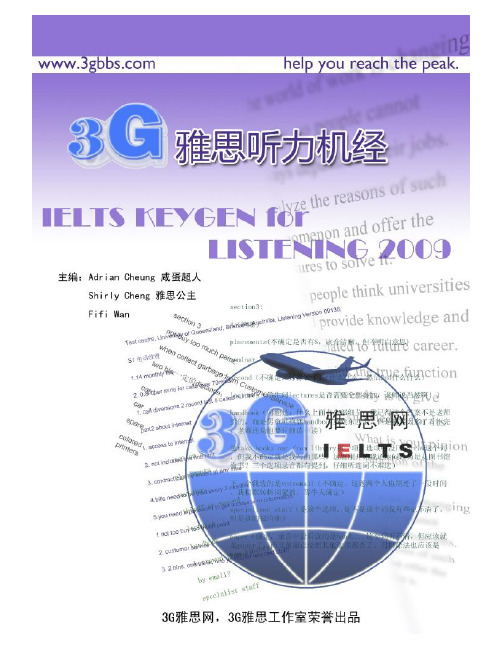
3G5 Drinks extra money 6 45% 7-9 7 music-finding of a band 8 order flowers name card 9 10 Janice (Corgen) Section 2 = V07134 S2 Section 3 , , 21 undeveloped areas 22 a wide range of accommodation 23 owned by local communities 24 training 25 sun wildlife mainly Big Five housing Big Five local housing 26 27 volunteer: conservation disadvantage 28 B sustainable 29 C economical travel 30 A Section4 = V30090 S4 Version 08113 2008 12 04 Section 1 Occupation Waiter streets , health services, police, schools Section 2=V26S2 Section 3=V07109S3 Section 4=V30015S4 Version 08114 2008 Version Section 1 1. 2. 3. friday, 4. 510 5. 6. A. poor quality B. instructions are confused C. the payment system is unsafe A, 7. 8. E-MAIL, A.by e-mail 9. Section 2 1. 134 titles3G ; : ID: Adrian QQ:63991371 (2009 1,the big five(interview local people, swimming pool)126 3G anyaidea 2008-12-8 9:24:00online shopping sites on selling clothes ( buy equitments for sports computer Saturday, sunday form letter on job application ( C. a lot of choice (A. cost less, B. save time, online shopping SaturdayCDB (CDs) from other countries are available B B B fresh products (FOOD), (imported CDB. need a phone number c. a help line) 1933G2. company annual reports 3. trade journals 4. a bookshop 5. 1.95 pounds( dvd up to 4 weeks renew 6. 4 weeks (standard borrowing periods standard periods) 7. 12 ( 8. teenagers ( 9. an eletronic card ( 10.Tuesday, Friday ( Section 3=V07234 Section 4 passion fruit of Indonisian economy 1-8 1. passion fruit 800 2. A. noticblly increased ( *) doubled ecceed ** proportion) 3. A.the weather ( weather * passion fruit 24 a computer 6 teenagers your PIN number 10 302009 18 weeksB certain altitude passion fruit West B.declined,C.climate B worm passion fruit pest B*4. B. can be grown through the whole year B, C. the taste of passion fruit becomes better B 5 A.apperance of C. the unreality( transportation passion fruit 6. C. it is addicted-free 7. B.price unstable replace old trees 8. C. less reliable ( Kenya June to July Newzeland skin ( shortage A Feb to July C, most of them are domestic comsumped, c compared to Kenya, in Newzeland, price fluctuated) attrative) A C B passion fruit unreliablility ) of95% are exported to South America socio-economic effects 9 a sizable of workforce 10improve the use of land Version 08115 2008 Section 1=V30080S1 Section 2 A Map 12 133G ;:ID: Adrian QQ:63991371 ( 194)3G2009 13G film studiox380556314 GH film Dmain buildingDEFGH3Gshentt32141. accommodation: right to the main hall, with corridor connect 2. paint area: the building on the other side of the river 3. student gallery: the house on the bottom left 4. film studio: One of two houses in top left... 5-8 (wildlife, sports, people, landscape, farm animal, etc, 5. wildlife (sure) 6. sports (sure) (mentioned olypic) 7. people (sure) (the portait of a famous person) 9-10 8. landscape (sure) (the scene of farms, river views. there is an option "farm animal" which is a pitfall)3G ; : ID: Adrian QQ:63991371 ( 195 )7)3G9. Japanese (sure) (Japanese paint, visit australia) 10. concert (sure) Section 3=V07134S3 Section 4=V40112S4 Version 08116 2008 SECTION1: 1-3 1. Eshcol ( 2. 4-6. 7-10 7. asthma 9.4.30pm 10. for all ages/ladies SECTION2: 11.normally, 7:30pm 13. 14. 15.locker 16. 17. 19. 20. reception SECTION3: 21. 22. reference skills management of time essay 12 weeks fire drill 18. tutorial fee, cannot pay by cash parking ticket .ask for permit Inrtoduction ( normal 8 ) heart problem 8 primary school evening ) 3 3.Dr.Gormley( ) evening appointment 12 202009 1employment medical, regular check ,sports injury12.Administration officer common room private study security officer23. presentation 24. longer the time of essaies 25. 26. tutorials deadline of dissertation27.more organised 28.wider reading 29.honest weakness 30.training Version 08120 2008 Section 1=V60141s1 Section2=New 1 26feature 11 kids favorate : dongkeys 12 apples 13 lags is 6 dollors3G ; : ID: Adrian QQ:63991371 ( 196 )3G14 figs :16 15 tomatoes 16 discounted/cheaper mataching 17A 18C 19E 20F Section3=v66s3 Section 4=New bee optic 31.C brain contrast color .. 32 C 33.body 34 distance 35 warning 36 radar 37 speed 38 urba 39 the earth 40. water Version 08121 2008 S1 3 S3 S4 4 31 36 A Dynamic B Yam 3 3 31 3 C modern 31 *****bones______( 32 *******________( 33/34/35/36 plants 37 40 37 38 39 40 ( _______ animals , sea level, hunting , new creature) 16 aim ______ environment change and cause the less of ________. V30080 style 3 C modern,6 animal image,XXX(cannot remember),sea levels,creation( V30037 6 3 4 19 book farmland,eighteenth,bird, gift shop S2=V30072S2 2 2 China2009 1Section4: Australia aboriginal rock paintingsVersion 08123 2008 2 section 1: v30036 section1 section 2: V21 section2 section 3: v30039 section3 section 4: v30062 section43G ;:ID: Adrian QQ:63991371 ( 197)3GVersion 08124 2008 2 23 Section 1=Version06110s1, Section2= 1) don't need ANY storage space 2) easy to do calculating 3) bank statements 4) provide evidence of information 5)Health Department 6)Sports Center 7)Start from April to March to 8) penalty up to 3000 pounds ( 9) the government will assume you make a mistake 10) download the form from website S3=version30020s3, S4Version30090s42009 1Version 08125 2008 3 1 S1=version40102 section1 S2=version30020 section2 , 2 , , SECTION 3: , , . , keep , internet. , , . writting dairy.dairy Professional Learning, diary, children behavior of pupils, data assessment, presenting results video recording interviews, the internet, simulation simulation . , SECTION4. underground salts , hospitals, slow, Health International, 9 litres 7-9 maximum 9 , family , glass, 12.5 , UV germs, colletion tank Version 08126 2008 Section 1 = V50106S1 Section 2= V30044S2 Section 3= V30076S4 Section 4 = V07134S3 3 8Version 08129 2008 4 5 Section1 1: radio 2: ...402... 3:E-mail: mj@ 4 2 2 3 5 5: 49 6 Union Bank 7 joint ( ) single joint famliy 8 9 10 video , Section2=V50133S2 Section3=V06316S3 Section 4 s4: ethical behaviour 1 four decades 2 more accountable 3 Private Property 4 young people 5. safety standard 6 cooperation between management and training and philosophiers 7 different level of morality 8 more global3G ; : ID: Adrian QQ:63991371 (.famliy,) 1983G9 privacy in areas such as health 10. business ethics Version 08130 2008 4 12 S1=v30033 s1 S2=v07134 s3 S3=v07234 s4 Section 4 1 1920-30 60% public transport 2 uncomfortable freedom 3 4,1960 polluted 5 tax 6 general election 7 links or lines 8 relationship 9 advertisements 10 shopping centers2009 1History of the Car in Australia 1890's -1960's Birth of the Car The worlds first practical automobile to be powered by an internal-combustion engine was patented by Karl Benz on January 29th 1886. The patent was granted in November of that year, and with that the birth of the Automobile began. It had three wheels and seated 2 people. Benz & Company became the worlds largest manufacturer of automobiles by 1900. Just 11 years later one of the first petrol driven - and in later designs - the first fully enclosed body cars produced in Australia was invented by Harry A. Tarrant in 1897 in Melbourne. Tarrant was later joined by Howard Lewis, and together they produced another car using a 6 horse power engine. This car became known as the Tarrant, and over the years it underwent a number of design improvements and adjustments using both Australian made and imported components. The Powerhouse Museum in Sydney house a automobile engine produced by Tarrant Motor & Engineering Co dating back to 1908. Australia was already importing cars in the early 1900s from the UK and America. In order to protect local manufacturing, the Australian government introduced a customs duty on imported vehicle bodies. While this duty placed some pressure on imports, local manufacturers were still producing less than half the amount of imports in the early 1910s. As the government recognised the growing importance of the auto building industry, so did the import tariffs. In 1903 the Australian Motoring Association was formed in NSW, SA and VIC. The primary role of the association was to protect the interests of pioneer motorists. These early motorists were well-off members of society who enjoyed the novelty of engineering, as automobiles at that point in time were considered expensive. However that vision changed in 1909 when the mass production of automobiles becoming a reality. 1910's - 1930's Automobiles became more affordable to a wider market, and by 1914 there were an estimated 37,000 cars and trucks in Australia. They no longer were seen as a luxury item, but a practical form of transport for both humans and produce. And so began the boom of the Australian motor industry and the phasing out of the horse, cart and carriage. This auto boom was dampened slightly by the First World War (1914-1918) however Australia still imported thousands of vehicle in the late 1910s. After this period, the economic climate improved in Australia, creating wealth and prosperity among a wider group. At that time the presence of the motor vehicle became more common, with people indulging in automobiles as a form of pleasure. The automobile became a symbol of financial success and social status, in-turn, boosting the economy with the increase in auto sales and production. This pressure led to the development of greater infrastructure, particularly in the metropolitan regions with the building of roads and bridges. Most notable in Australian history was the building of the Sydney Harbour Bridge in the 1920s. The bridge was officially opened on the 19th of March 1932. It cost sixpence (five cents) for a car to cross and three pence for a horse and rider. As a direct result of the booming auto industry, the Australian Automobile Association was formed in 1924. The AAA is still today recognised as the voice of Australian motoring. Many car assemblers began to flood the market. Major manufactures including General Motors, Chrysler, Volkswagen, Ford and3G ; : ID: Adrian QQ:63991371 ( 199 )3Gthe British Motor Corporation were all increasing their manufacturing capabilities.2009 1According to the Australian Science and Technology Heritage Centre, by the late 1920s there was 1 vehicle to every 11 people in Australia. This was a significant increase from just 8 years earlier when the ratio was 1 vehicle to every 55 people. 1930's - 1960's The Australian auto industry (and world wide) was struck down by the Great Depression in the 1930s. Many people working in the industry lost their jobs, with unemployment reaching 29% in 1932. The auto industry was further stagnated with the onset of the Second World War at the end of the 1930s. During the late 1930s to the mid 1940s car manufacturing had a different focus in Australia. Rather than focusing on the civilian car, manufacturing efforts were focused on vehicle bodies for the defence force during the war. At the end of the war the car manufacturers took a new focus, rekindling the spotlight on the civilian car. The manufacture of the first all-Australian motor vehicle occurred in 1948, producing the brand we all know today The Holden. The Holden brand became the iconic Australian symbol of success and was owned by many Australian families. It was during this period that the birth of the Holden FX (1948) and the Holden FJ (1953) took place. Luckily the 50s and 60s were the years of affluence, and the general public jumped at the opportunity to own a vehicle, testing the manufacturers abilities to keep up with demand. The Roaring 60s were the boom years for manufacturing and in particular for the manufacturing of automobiles. Did you know that in * 1928 the first traffic lights were installed in Melbourne * 1929 the first car radio was introduced * 1937 the first all steel body was manufactured in Australia Version 08131 2008 4 19 S1=v20023 S1 S2=v30018 S3 S3=v30074 S3 S4 . 8 history. 1 C 2 A. A B C enging 15 enging 3 design and manufacture 4 evolution 17 enging 5 reproduce 6 models 19 enging 7 men 8 Speed 20 enging 9 handle 10 do not need to meet to discuss Version 08132 2008 9 18 Section 1=V07148S1 Section 2=V06113S2 Section 3= S3 SECTION 3 research on old house choosing, Unanswered.... section3 sth. about flowers strangers 3 Section 4=V07147S4 Version 08133 2008 s1=V30074s13GCAENGING MEETvillages, fire places, Age, Occupancy, planners, 12 common social functions 1 2 food, children, edible conduct 3 evenmental ability424: ; ID: Adrian QQ:63991371 ( 200 )3Gs2 42009 1dorm film studios3=V30038s3 s4 4 Q3 conference centre Q4 supermarket car park do exerciseQ1 6 hotelQ2Version 08134 2008 5 10 section 1 :30072 S1 section 2 :V66 S2 section 3 Section 3 1. where were the Asian honey bees firstly found in Australia in the past? A.Queensland A Queensland B New south wales C several province A. harmful to AU bees 2. What effects Asian bee to ***? A. harmful to AU bees B. *** C. *** 3. The feature of AU bees C AU Bee ) A honey quality is not high ( B Asian Bee C be exported abroad . . ? Asian Bee effects to AU A 4 A Economic decline ( , , B. allergic C 25-30t 5. Asian Bees only eat: insects 6. feed feeding 7. ( too hard) use water to soften them 8. ake them to laboratory to analysis them 9. scientists look for the wings of Asian bees 10. research is more reliable than live asian bee Section 4: Mostown, 31-35 Multiple choice 31. why they choose that research topic? A.*** B. History ******* record C. rich library reference ( ) 32. The Mostown was first A Handcraft B. Agriculture famers brought the cattles to sell in the market C. Animals 33. ? A. restruction B development ( expanding the town, ) C*** 34. decline ; A.*** B. transport C. town planning 35.Bell Tower A *** B*** C Prison,,..)3G ;:ID: Adrian QQ:63991371 ( 201)3G36-40 Method *** Interviews Old newspaper Photographs Advantage Market Social History proved Disadvantag produce *** useless Crimes2009 1Version 08135 2008 5 22 S1 Gym Membership, Jean Simpson( sample) 1 Birth: 24th August,1979 2 Address: Fox LANE( FOX for the animal ) 3-4 3 the yearly membership A. Get more fitness B. Free Gift C. Saving money ( yearly 4 Jean on June this year A. Holiday B. Travelling for business : her sister gets married in next year) C. Get married ( 5-10 CACBCA A. Interest in Future B. Interest in Now C. Not interest 5 Fitness interest now, but before this class 6 Weight class 7 Swimming 8 Pool 9 10 Child mind ( S2:=V50147S2 S3=V08118S3 S4:Archaeologist Conflict and xxxxx 1) resources 2) age Technology and techniques .. Use 3) Use 4) of form Use 5) Farming Soil damage by Use of 6 machines Use of 7 chemical Law Scotland 8) that was found must be report Ireland - . 9 licence England - 10) Version 08136 2008 Section1= V08118S1 SECTION 2 1.better to use internet to find a job internet internet 2. 3. resume can not be too long ( long, should be typed advertisements internet 5 31fitnessXX class)newspaperswork agency internet.4. introduce more your personal skills3G ; : ID: Adrian QQ:63991371 ( 202 )。
2009年1月10日机经

2009年1月10日机经01月10日雅思A类机经[听力]听力超级简单,第三个section是几经上的,说的chemistry,egineering什么的,我机经只是看了看,就发现这一个是老题,不过其他section,尤其是前两个挺简单的。
听力是2新2旧, S4 是V08131 的S4听力:S3,4都是机经上的,一个是转专业,一个是engine的发展V09117貌似三新一旧Section 1一个男的咨询女的关于**(忘了)的事情,全部填空答案好像有1.时间:25th June有问一个有什么好处的,----- products,晕,第二个就开始没听到了,后来硬着头皮写了一个use(** public) in advance要先给多少钱的,有误导,先说如果是member 就 180,不是A. ban filmB. seedsC. children's toy填空:1.最好的包装是paper2.为什么进口的物品会有问题right labels3.忘了4.要提前多少通知海关from 2 to 10 days before arrive the airportsection 3,机经version 07148section 4,***的发展历史之类的,两个选择其余填空题目忘了,最后一个空填meet[口语]1.墨尔本的。
但是跟国内的都一样所以大家也参考一下吧sports events u watched or took part in.when.what it is.who... why u remember it...然后我同学还考了关于旅游的还有个阿拉伯人考了family...但是他说不是问关于他的family 他说是general family...我part 1 有关于letter的。
然后我同学有考到自行车的。
2.长春的~说有名胜古迹~旅游~演讲3.合肥 P2 performence 最多, LAW,Photo,景点次之其他 book,orgnization,家庭教育,2008一件新闻,帮助别人的经历,A child, long journey。
3G雅思听力机经2009(2)
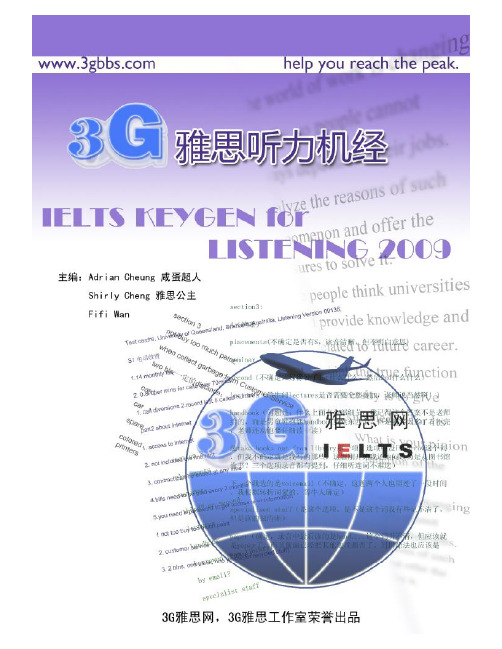
3G2009 1A. sth like providing the contact list B. contact the agencies for the student C.------------20. The lectures suggestion: A. overseas students can pay for additive language course. B. keep on learning to improve listening C. keep on learning to improve spoken english D. keep on learning to improve reading ability Section3 biology syndicate much deeper research share ideas mountain building 17th May. 29th May 30 minutes 30 minutes and 40 minutes journal articles/ articles from journal Internet sources 21-22. 21. 22. :( 23. , , : :share ideas Adrian : much deeper research 4 research topic list, , . , topic . . , topic buliding, , building) . . , , , , . , . , , topic , , , . .. 23. : research Mountain Building Adrian : 24-25. from 24. 17th May to 25. 29 th of May Adrian : 16 , , th no more than 3 words presentation 26. : 30 40 minutes Adrian : NO MORE THAN THREE WORDS, 27. 10-15 minutes : questions & discussion Adrian :questions s 28. articles/journal Adrian : , articales journal articles 29. courses from Internet 30. , , : photocopy of notes Adrian : photocopy a Section4 Night Shift Worker17,1730 40 minutes , ,31. 32. 33. 34. 35. 36. 37 38. 39. 40.internal clock disorder Social Matters effects, huge increase, **** internal clock Internal clock light and dark unsocial hours (working~ ) heart and stomach depression mental ability performance family relationship/lives divorce pal group relationshipdepression family livesNight Shift Workers performance divorceVersion 71 Section1 intermediatehomestaya girl (60-80pounds)19 100 ,1. 14 Hill Road 2.The best time to contact with 9 00am -9 30am 3. 19 4. intermediate 5. : northwest 6.FOOD REQUIRE: omnivore3G ; : ID: Adrian QQ:63991371 ( 74 )3G7-8.homestay : rear garden only one guest 9. :23rd March Max Rent: up to 100 pounds per week 10. 60~80 up to 1002009 1****NAME JENNYCHAN J-E-N-N-Y-C-H-A-N ***** 14 Hill Road 2237676 719 HOMESTAYintermediate------------------------------------------------------------------------------------60-80UP TO 100 PONDS23rd March Section2(charity walking holiday) , 4CHARITY86 1.How long for charity walking hoilday: A.6 days B.8 days C.10 days 10 8 6 to 16,but actually walk for 8 days, 2. PIE CHART at least C. 65% funds will go to the charity3G ;:ID: Adrian QQ:63991371 ( 75)3G2009 13.B.55% C.65% the fund from individuals will go to: A. a teacher B. a school C. a studentA.30%6-16walk for 8 days 60$320050 student654.5.6.. , have to be _____ A. already very fit B. interested in getting fit C. very fit extremely fit ?( LOCAL ) A. all the own things B. some of the own things C. special feature : tradition of xxxxx Region is A. making carpet B. carve woods C. weaving blanket Date Day 1 Day 2 Day 3 Day 4 Day 5 Day 6 Day 7 Day 8 Day 9 swimming in 9. waterfall visit 10. weaving village rest day visit ancient 8. temple spend one day on a 7. forest Plantopic supervisor/department decide topic, supervisor(department decide), drop-out rate(45%), advices(work hard) CAN SUPPORT YOU SUITABLE FOR YOU DEPARTMENT ALLOCATE Lack of confidence advices(help from friends; work hard) 6 1. The student should choose a research topic: A which will be POPULAR B ***** C 2. C. someone who make you comfortable Adrian : C someone who make you comfortable{ }3G ; : ID: Adrian QQ:63991371 ( 76 )Section33Gfifi 3. ,fifiwan@ : 2005-01-082009 1sectionA. B. resource research support C. 4.The best way to get information A. B. C. talk to a person { , personally you know" talk to the person } 5. According to Dr.Shephen, a supervisor is A. the nature of their qualification B. a personality well suited to the student C. an ability to make the student work hard 6.Which group shows the average PHD level drop-out rate for students : b.52%:"it is too expensive to go every schoolA ProblemBC Things to do 7.to have a starter project / do a projection Talk to pool-candidate students 9.accept help from friends 10.work hard Things not to do Take other peoples Translation-that to degree 8. Lack of confidence Studying with two suggestionSection4 monologue/lecture Housing monologue water( ,electricity , land, communication rural areas , population and geographic housing impact. innovation workshops and factories electricity Solar Power, rural place, alternative energy. Houses of the Future Professor Janet Blake to predicted 31. problems and needs of population and impact are increasing. WATER will be 32. more costly and less predictable. therefor recycling and rural area collection will be acceptable. by 2010, 1 in 7 US and European buildings will have rainwater lacks-so 33.innovation in design and materials expected. ELECTRICITY costs will increase and lead to growth in 34. solar power use e.g. development in Adamite will cut domestic use of electricity by 35. 30% LAND shortage especially in large cities. sollution smaller blocks for individual high-rise buildings. workshops and 36.factories 37. COMMICATION TECHNOLOGY: number and 38. distribution of population: 10 million households who living in the city. to 39. 2021, the population will increase by 40. 24% Version 20023 S1=V40101S1 Section2 student union 1 ** 2 33GSPEACKER Aim of talks733 credit card? bank ;supermarket 5:credit cardmost of shops) 77ID: Adrian QQ:63991371 (3G4 5 6 7 medicine swimming pool 1 1 accommodation and financial problems student information desk information page towel non-medicine items2009 1union 8 9 10 Section 3=V32 S3 Section4 2fruit trees some trees wax _______, polish furnitures, furniture, good bless me eat harmful insects and ________, sleep disease destroy whole building harmful to humans ,and cheaper life cycle, resistant breedcandle, sleepAdvantages of insectsSome help flowers and fruit trees Some can produce honey Some bees can also produce wax for candle and polishing car polishing car Some eat harmful insectsDisadvantagesmanjuansleeping indeed sickness the whole family: chemistal method Maybe harmful to human become 38.resistant insect Biology method Breeding control cheaper understanding of insects' life cyclesVersion 3×××× Date:2005 S1 v30044s1 S2 v71s2 S4 v40s4 Version 30014 Section1 walking611SydneyS3S0034s3 presestation and feedback tutor16 1. date:26th May fifth ******* 2.Time: 7:00pm 3.seats in: circle/front 4.seats number: 8/21~24 A21-24 5.type of Card: Master Card 6.VISA number: 32907876440128993G ;master card number8 16ROW number 21-24 2899ID: Adrian QQ:63991371 (seat number:) 783G2009 1: Mr. J.Whitton Jay J J INITIAL home address:42 South Street 8. 9.addtional requires:put on the mailling list (mailing list ) 10.book special audio equipment headphones Section2 A3 10p copy machine staff Section3 Hotel crime crime poor area inviolence crime 1. crime Hotels and Shops Shop prevention crime five and half years 2. 3. Most frequent happen place: room 4. hotel crime York York. York 5-6. Hotel crime locking door ( ) they don't check identities 6. hotel crime hotel use main entrance avoiding use underground car park 7-8. 7. , hotels 20% reduced by 20% 8. : To enhance relationship between insurance company and tourism organizations New crime trends: 9. York voilent crime reduce by police 10. often increase in:poor areas Section4Version 30015 Section1461why she want to see this doctor? A oversea student B C she heard that he is a good doctor A B C interrupt the work worry about my headache23 A B C 4 A give her recipe B advise her to do the optic examine C advise her to wear glasses when using computer <no more than 2 words>: take the 5.third turning take the 6.first right to *** two words Personal info Name : **** (example) Address: 7. 21A Eagle Road postcode: 8. London E11 Family medical history Both of her parent had 9. bad eyesight Other attentive things allergic to ***** 10. no allergy / none Section23G ; : ID: Adrian QQ:63991371 ( 79 )how long had she this case before? what reason3Gstudent union 1 ** 2 3 4 5 6 7 8 9 10 7 3 3 credit card? supermarket credit card bank 5 medicine non-medicine items swimming pool 1 1 union accommodation and financial problems student information desk information page2009 1most of shopstowelSection3 BACK TO STUDY 1 2 3 4 5 6 ? BOOKS AND TITLES / printed card / card catalogue RECOURCE ? computer journal ? printed list British Library and other university photocopy of article ,10 save lots timeName or type of book *** *** *** *** Section4which library 27 various department library 28 main library 29 microfilm library 30 CD-ROM libraryLondon Facility cable sewer 32 tube railway underground 33 34 35 first in history smoke carry post resource post mails Detail (example) **** 31Layer UN 10m UN 20m UN 30m UN 40m UN 50m UN 100m UN 200m UN ***m6 7 8 9 10North London ( ) rubbish / dust / comtaminants more than 100 underground stations 2 million passengers / transportation / traffic known as cut and coverVersion 30018 Section1 53G ; :LAinternational student museum accommodations entertainmentID: Adrian QQ:63991371 ( 80 )3GJohn Lee Section2 15 Station Avenue new castle2009 1260000 section2060-------12 --------------50p 9:00 50p ----9:00amSection 3 6:30 C d Section 4 1998 lake washing 31. safe and reliable 32. domestic, industry, agiculture, pure 33. power supply is scared 34. 35. 36. 37. drinking 39-40. 39. 1988 A. unadequate B. nearly adequate C. admirable 40. 40 Version 30019 Section 1 1 A.limited B.admirable C. unreliable B. (i forgot, but not relevant) data C. inconclusive : A. cause a concern : A. unadequate ? surface It's prone to contaminator supply expect supply to be washing rainfall. river and lake air pollution. It is useful unless it's not air polluted lakes (and dam) e lecture safe and reliable, air pollution ,lake and dam, safe reliable drinking unreliable , pure air pollution 1988 data B 5:30 6:30 7:30 do farm work AB, hate1. 2. 34.3Gcost, speed , and insurance: ;. letter and 3.parcel loss/lost 4. contracts) 81ID: Adrian QQ:63991371 (3G58 A. Registered mail B. 5. for second class ------C.Recorder 6. for first class ------ B. 7. most expensive.----- A. 8. 2.7 pounds 9---10 9. a Monday 10. a Section 2 1960 recorder b. Tuesday c Saturday 4 P b recorder National Art Centre, 1983 p c recorder p Tuesday Monday Tuesday , 3 , Special mail Registered mail registered , Special mail 4 C.Recorder2009 1recorderclassical music1950, 1940s 1960s rebuilt 1980s opened to the public : 1. classical music. , , 2. 3. 1960s rebuilt 4. 1980s opened to the public : , 1983, , 1983, 5. ? city council 6. 362 3 , : garden hall 3 lives /3 labors 05 10 16 faces of china ,,bookshopcity councilbook shop S 362 ?7. 8. 9.: : 4.5 : ::lifes 5.5 5.5, 1 , 4.510. Section 3film , westen** A.criminal story B.quiz show C. A tiring bar chart 11-14 story conference planning ** 4 Production. produced by videotape editor3G ; : ID: Adrian QQ:63991371 ( 82 ), :Bfilm crime social AB insping Cproperlybias C3G, , CHILREN, 39 .the advantages of working in this company is: B. C. ******* A. workload B. flexible workload time . 40. Apart free transport, what other benefits those women can get C except free transportation A. manifold training, B. computer training, C. literacy training computer programming ( , , , , ) ...2009 1the benefits of benefits,literacy training Version 30034 Date:20040417 Section 1 complain xxxx Example 1---4 1 Surname Jerry Northwaite 2. 23rd January before 25t item 3---4 3. bicycles to 4. garden tools 510 1. 2.rdValue Clock 5. clock handles , Damaged toy 6.Curtains 9.Videos 7.torn in several places lost 8. curtains torn 10. Video 12 250 items. clock hands broken ; hands broken 100 sure. hands 2300144 12 144Section 2=V68 S2 Section 3 confirm presentation 1.date: 14 th to 24 th June 2.time: early evening 3. 20-40 ?you need to do a report to the seminar group 4.items you have to take : a.material b.project c. list of objectives d.booklist 5. project outline 6-8.the purpose of presentation a.how well you can do to design research b.did you do wide reading C.theory chapters ( ) 9.the things you get: a. a check list b. 10.get information from: Section 4 Kakadu National Park Kakadu National Park NO MORE THAN 2 WORDS3G ; : ID: Adrian QQ:63991371 (5) 933G31---33). 31. the population of this tribe ? 300 a quarter of a million 250000 1 250,0002009 1300 32.fire management 33. education program 34---37 Queastion 34. over-grow plant weeds 36. two species of crocodiles --------------Wild plants : 38--40 Session1 Driving 39.Exhibitions 40. Permits required Exhibitions : N S1 (Northwaite) (23rd January). are broken);(curtain); bicycles toy garden tools ; 250 125 S2 3 HOW OFTEN S3: give a presentation, presentation paper? (a check list) (seminar group) presentaion S4 T_T 3000 biological 2 crocodile items.clock every 20 minutes clear argument ;(project outline) 1 weeds handles s 2004-4-17 15:49:00 Session2 Session3 38.Only for Touring Session 4 Session5 Solution 35. biological Removal ---------------------37. Public Awareness campainHistory of Kakadu National Park Prologue The name Kakadu comes from the mispronunciation of Gagudju which is the name of an Aboriginal language spoken in the northern part of the Park. Kakadu is ecologically and biologically diverse. The main natural features protected within the Park include: * four major river systems: o the East Alligator River, o the West Alligator River, o the Wildman River and o the entire South Alligator River; * six major landforms o estuaries and tidal flats, o floodplains, o lowlands, o the stone country, o the outliers and o the southern hills and basins; * a remarkable variety and concentration of wildlife; o over 280 bird species o over 60 mammal species o over 50 freshwater species3G ; : ID: Adrian QQ:63991371 ( 94 )3Go over 10 000 insects species o over 1600 plant species.2009 1Aboriginal people have occupied the Kakadu area continuously for at least 40 000 years. Kakadu National Park is renowned for the richness of its Aboriginal cultural sites. There are more than 5000 recorded art sites illustrating Aboriginal culture over thousands of years. The archaeological sites demonstrate Aboriginal occupation for at least 20 000 and possibly up to 40 000 years. The cultural and natural values of Kakadu National Park were recognised internationally when the Park was placed on the UNESCO World Heritage List. This is an international register of properties that are recognised as having outstanding cultural or natural values of international significance. Kakadu was listed in three stages: Stage 1 in 1981, Stage 2 in 1987, and the entire Park in 1992. Approximately half of the land in Kakadu is Aboriginal land under the Aboriginal Land Rights (Northern Territory) Act 1976 and most of the remaining land is currently under claim by Aboriginal people. The areas of the Park that are owned by Aboriginal people are leased by the traditional owners to the Director of National Parks to be managed as a national park. The remaining area is Commonwealth land vested under the Director of National Parks. All of Kakadu is declared a national park under the Environment Protection and Biodiversity Conservation Act 1999. The Aboriginal traditional owners of the Park are descendants of various clan groups from the Kakadu area and have longstanding affiliations with this country. Their lifestyle has changed in recent years, but their traditional customs and beliefs remain very important. About 500 Aboriginal people live in the Park; many of them are traditional owners. All of Kakadu is jointly managed by Aboriginal traditional owners and the Australian Governments Department of the Environment and Water Resources through a division known as Parks Australia. Park Management is directed by the Kakadu Board of Management. Establishment Kakadu was established at a time when the Australian community was becoming more interested in the declaration of national parks for conservation and in recognising the land interests of Aboriginal people. A national park in the Alligator River region was proposed as early as 1965, but took until 1978 for the Australian Government to make arrangements to acquire the titles over various tracts of land that now constitute Kakadu National Park. Kakadu National Park was declared under the National Parks and Wildlife Conservation Act 1975 (NPWC Act) in three stages between 1979 and 1991. The NPWC Act was replaced by the EPBC Act in 2000. The declaration of the Park continues under the EPBC Act. Each stage of the Park includes Aboriginal land under the Land Rights Act that is leased to the Director of National Parks or land that is subject to a claim to traditional ownership under the Land Rights Act. Most of the land that was to become part of Stage One of Kakadu was granted to the Kakadu Aboriginal land Trust under the Land Rights Act in August 1978 and, in November 1978, the Land Trust and the Director signed a lease for the land to be managed as a national park. Stage One of the Park was declared on 5 April 1979. Stage Two was declared on 28 February 1984. In March 1978, a claim was lodged under the Land Rights Act for the land included in Stage Two of Kakadu. The land claim was partly successful and, in 1986, three areas in the eastern part of Stage Two were granted to the Jabiluka Aboriginal Land Trust. A lease between the Land Trust and the Director of National parks was signed in March 1991. In 1987, a land claim was lodged for the land in the former Goodparla and Gimbat pastoral leases that were to be included in Stage Three of Kakadu. The other area to be included in Stage Three the area known as the Gimbat Resumption and the Waterfall Creek Reserve were later added to this land claim. The progressive declaration was due to the debate over whether mining should be allowed at Guratba (Coronation Hill) which is located in the middle of the area referred to as Sickness Country. The traditional owners wishes were ultimately respected and the Australian National Government decided that there would be no mining at Guratba. In 1996, the land in Stage Three, apart from the former Goodparla pastoral leases, was granted to the Gunlom Aboriginal Land Trust and leased to the Director of National Parks to continue being managed as part of Kakadu. Human impacts Human impacts during the 19th and 20th century have been significant. Introduction of Domestic Asian Water Buffalo from Southeast Asia has resulted in damage to the fragile floodplains and wetlands. Buffalo have largely been eradicated from the area now so the land is rehabilitating itself. Crocodile hunting which has been banned since 1972 made a huge impact on crocodile populations. In the 30 or so years that they have been protected, however the crocodile population has recovered so successfully that some consider there to be an over population. Mining has an obvious impact on the landscape, but only one operational mine (Ranger) remains. Mine operators are required to completely rehabilitate the area once the operation is wound down. Some small scale logging occurred in the early part of the 20th century, but little evidence of this remains. Tourism represents a significant human impact to Kakadu National Park with hundreds3G ; : ID: Adrian QQ:63991371 ( 95 )3GFire management2009 1of thousands of visitors arriving annually. Infrastructure such as roads, tracks, interpretive signage and shelter, accommodation, telecommunications and other services must be provided to support this activity.Fire is part of the landscape of Kakadu as the Park contains large areas of woodland and grassy plains that are subject to long periods of dry hot weather. The flora of the region has adapted to frequent fires. Fires in northern Australia are less threatening than in southern Australia as many of the trees are largely fire resistant while other plants simply regenerate very quickly. Controlled burning is practiced by the national park in consultation with traditional owners who have used fire as a land management tool for thousands of years. Fire is an important hunting tool for Aboriginal people using it to flush out prey. The other benefit is that once the fire has gone through an area the tender shoots of the fast regenerating grasses attract wallabies into a clearly defined area. Birds of prey such as Whistling Kites also rely on fire to flush out small animals and are usually found in large numbers circling a fire front. Other species such as white-throated grasswrens have declined because of too many fires. Aboriginal people understand that fire is necessary to clean up the landscape and believe that many small fires are preferable to one large fire. Tourism Kakadu National Park is a major tourist attraction in Australias north. Visitation in 2005 was 202,000. Kakadus dramatic landscape, Aboriginal cultural significance and diverse and abundant wildlife are what visitors are drawn to. There are many beautiful waterfalls and gorges within the Park that are popular with visitors such as Maguk, Gunlom, Twin Falls and Jim Jim Falls. Kakadu National Park has some of the best examples of Aboriginal rock art in Australia. The sites of Nourlangie and Ubirr are among the most visited locations in the Park. It is possible to view some of Kakadus diverse wildlife at places like Yellow Water Billabong, Cooinda on board a wildlife cruise or at Mamukala Wetlands or Anbangbang Billabong. The Kakadu region is one of the worlds best for bird watching as approximately 30 percent of Australias bird species can be seen here. Large saltwater crocodiles are also commonplace and visitors are likely to see them at Yellow Water and East Alligator River so it was no coincidence that the Crocodile Dundee films were shot here. Visitors are urged to exercise caution around crocodiles as they have been responsible for a number of fatal attacks. Recreational fishing is a popular activity inside Kakadu National Park. The main target species is Barramundi and the most popular locations are Yellow Water, the South Alligator and the East Alligator River. Hunting is not allowed in Kakadu National Park. There are several accommodation options in the Park, mostly found in the town of Jabiru, as well as a range of services to cater to visitors needs. Visitors can experience Kakadu National Park with a recognised tour operator or they can drive themselves. Many of the Parks sites are accessible by standard two wheel drive vehicles, but areas like Twin and Jim Jim Falls and Gunlom require four wheel drive vehicles. Visitors can experience Kakadu National Park via the Natures Way tourism drive which is a loop from Darwin to Jabiru then onto Katherine and back to Darwin covering approximately 900km. Park management The Park is proclaimed under the Environment Protection and Biodiversity Conservation Act 1999 (the EPBC Act) and is managed through a joint management arrangement between the Aboriginal traditional owners and the Director of National Parks. The Director manages Commonwealth national parks through Parks Australia, which is a part of the Department of the Environment and Water Resources. Title to Aboriginal land in the Park is held by Aboriginal land trusts. The land trusts have leased their land to the Director of National Parks for the purpose of a national park for the enjoyment and benefit of all Australians and international visitors. Traditional owners have also expected that having their land managed as a national park would assist them in looking after their land in the face of growing and competing pressures. They saw a national park as establishing a way to manage the land that could protect their interests and be sympathetic to their aspirations. Parks Australia and the Aboriginal traditional owners of Kakadu are committed to the principle of joint management of the Park and arrangements to help this happen are highlighted in Kakadus Plan of Management. The EPBC Act provides for boards of management to be established for parks on Aboriginal land. The Kakadu Board of Management, which has an Aboriginal majority (ten out of fifteen members), representing the Aboriginal traditional owners of land in the Park, was established in 1989. The Board determines policy for managing the Park and is responsible, along with the Director, for preparing plans of management for the Park. The Plan of Management is the main policy document for the Park and strives to balance strategic or long-term goals and tactical or day to day goals. Day to day management of Kakadu is carried out by people employed by Parks Australia, which is a branch of the Australian Governments Department of the Environment and Water Resources. Approximately one-third of the staff in Kakadu are Aboriginal people. The Mamukala billabong.3G ; : ID: Adrian QQ:63991371 ( 96 )3GGeneral facilities2009 1Kakadu National Park is linked to Darwin by the Arnhem Highway and to Pine Creek and Katherine by the Kakadu Highway. Both roads are sealed all weather roads although may be cut off periodically during periods of heavy rain. The town of Jabiru has several accommodation options, a service station, police, a medical clinic and a shopping centre with a range of outlets. The town was built for the Uranium mine that was established prior to the founding of Kakadu National Park and provides infrastructure for the mines workforce as well as the national park activities and tourism. Jabiru has a small airport from which scenic flights operate daily. There are no scheduled air services between Jabiru and Darwin however. Other small tourism centres such as Cooinda and South Alligator provide limited facilities. Cooinda, 50km south of Jabiru on the Kakadu Highway is the site of Gagudju Lodge Cooinda, Yellow Water Cruises and the Warradjan Cultural Centre. Fuel and limited provisions are available at Cooinda and there is also a small airstrip for scenic flights. South Alligator approximately 40km west of Jabiru on the Arnhem Highway includes a hotel and service station. The Border Store near Ubirr Art Site and Cahills Crossing, 50km north of Jabiru, is a general store. Camp sites There are a wide variety of designated camping sites throughout the Park. Jabiru, Cooinda and South Alligator all have commercial camping areas and are in close proximity to most of the important natural attractions in these areas. Some of the Parks campsites charge a nominal fee as these have shower and toilet facilities, others are free, however they have limited or no facilities. A list of the sites can be obtained from the Kakadu National Parks Glenn Murcutt-designed Bowali Visitor Centre or from their website. Version 30036 V30036 Section 1 , Tracy CheungC Insight into IELTS 1---2 1. 2. Tel No. Telephone 3---5D: Address6 Devon Road, Oxford :634096,: 54 but54grade C grade D grade C grade D BDE A air conditional B mileage C ********* D.tax E music equipment 6---7) 6. When should the man do when he return the car key of car? A before Monday morning B C 8 7. Why should the man do when he return the car key? :C. put it in the letterbox 8. Why should the man get discount? :A A. he works in a special company B, C.******** 9---10) ? 5 3 :Road map, sun sheet, first-aid kit, flash, *********** , 9. road map, sun sheet 10. first-aid kit and a flash light first-aid kit guide book Section 2 (=V68 S2) Section 3 ,4 21---24 21. What is the student news about? :D3G ; : ID: Adrian QQ:63991371 (: C. befor 8 clock Sunday night,5) 97。
英语_09年雅思机经总结与预测
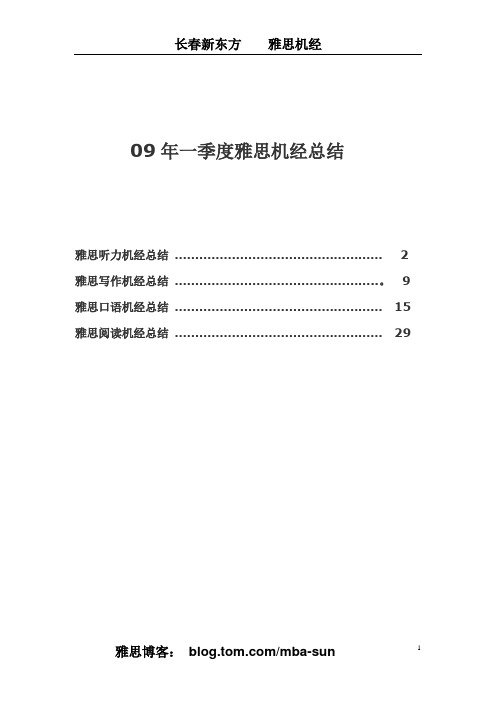
09年一季度雅思机经总结雅思听力机经总结 (2)雅思写作机经总结..................................................。
9 雅思口语机经总结 (15)雅思阅读机经总结 (29)09年一季度雅思听力机经总结第一季度的雅思听力题可以简单概括为:“新题”55%“旧题”45%“填空题”70%“选择及配对题”30%难度适中观察和分析了一月到三月雅思考试听力题我们可以发现,旧题的重现率还是比较高的。
除了一月十七号和二月七号这两次考试只在Section1中出现机经外,其他考试均有两个或两个以上Section出现了机经,覆盖率达50%--75%。
所以,对于广大考生来说,多加练习并做熟机经是非常重要的。
为了进一步说明这一观点,我想对部分考题按照不同的听力场景进行分析和归类。
第一季度不同版本的分类解析及部分答案Section1 V07141 S1租房场景Jim和Peter合租房子的问题peter说他的房间比较大,所以他出钱多一点,Jim的房间小,只要出80 dollars车子可以停在车库里,garage电话在厨房kitchen(?)还是bedroom?然后有一题是heater,又一题,说需要一个roaster两个人会在Friday evening 看球赛Jim在supermarket工作peter说希望Jim 1st June 搬进去Jim说他会在exam后搬进去对话题。
租房场景的常考考点及听辨关键词:房间大小的选择。
房价的考虑。
对车库,厨房,起居室,卧室等部分的要求。
对基础设施和家电的需求和选择。
租房者的职业和自身背景,习惯和爱好。
租房的起止日期等等。
对细节听辨要求高,往往考点散步在每段对话的2-3个回合中,信号词强烈。
Section2 V06125 S2段子题。
是红松鼠的文章说的是那种松鼠的名字,本来那个作者(可能是照相方面职业)觉得那种松鼠的名字没什么意义,结果作者研究了一下觉得很合适啊,名字的意思是躲在尾巴阴影下的动物,总之很形象,然后介绍那种松鼠数量减少的原因是NUTS 方面相关的,注意,前面这些是选择题,然后开始,然后作者介绍要照好这种动物的照片,要有什么技巧。
2009雅思考试听力分析
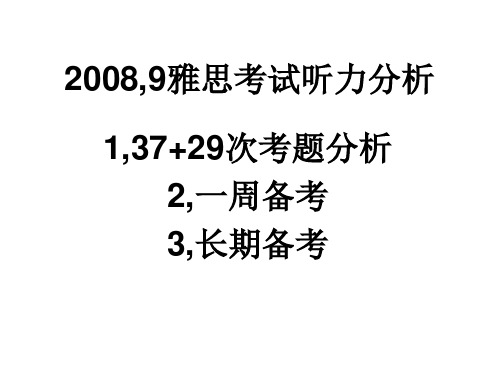
• 10月13日: S1=V07147, S2=新, S3=新, S4=新 • 10月20日:S1=V30038S1, S2=, 新 S3=V30037S3, S4=V41S4 • 10月27日: S1=V06134S1, S2=V05147S2, S3=新, S4=V40110S4
• 11月3日: S1=新, S2=V50233S2, S3=V30045S3, S4=V06148S4 • 11月17日: S1=新, S2=V06114S2, S3=30076S3, S4=新 • 11月24日: S1=V30049S1, S2=V37S2, S3=V30090S3, S4=新
• 3月1日: S1=V40102S1, 月 日 S2=V30020S2, S3=新, S4=新 新 新 • 3月8日: S1=V05106S1, 月 日 S2=V30044S2, S3=V07134S3, S4=V30076S4 • 3月29日: S1=V30034S1, 月 日 S2=V30059S2, S3=V30086S3, S4=V30074S4 • 2新 新
9月6日:S1=新, S2=新, S3=V06130S3, 月 日 新 新 S4=V08129S4 9月13日:S1=V06144S1, S2=新, S3=V39S3, 月 日 新 S4=新 新 9月27日:S1=V30064S1, S2=新, S3=新, 月 日 新 新 S4=V30074S4 6新 新
• 12月1日: S1=V30039S1, S2=V30085S2, S3=V07138S3, S4=V20023S4 • 12月8日: S1=新, S2=V06144S2, S3=V05130S3, S4=V30018S4 • 12月15日: S1=V30020S1, S2=新, S3=新, S4=V30061S4
2009年4月25日雅思考试听力部分参考答案
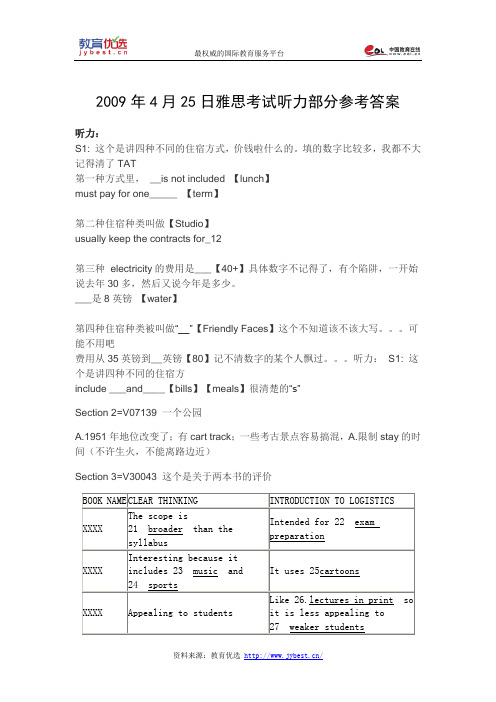
2009年4月25日雅思考试听力部分参考答案听力:S1: 这个是讲四种不同的住宿方式,价钱啦什么的。
填的数字比较多,我都不大记得清了TAT第一种方式里,__is not included 【lunch】must pay for one_____ 【term】第二种住宿种类叫做【Studio】usually keep the contracts for_12第三种 electricity的费用是___【40+】具体数字不记得了,有个陷阱,一开始说去年30多,然后又说今年是多少。
___是8英镑【water】第四种住宿种类被叫做“__”【Friendly Faces】这个不知道该不该大写。
可能不用吧费用从35英镑到__英镑【80】记不清数字的某个人飘过。
听力:S1: 这个是讲四种不同的住宿方include ___and____【bills】【meals】很清楚的“s”Section 2=V07139 一个公园A.1951年地位改变了;有cart track;一些考古景点容易搞混,A.限制stay的时间(不许生火,不能离路边近)Section 3=V30043 这个是关于两本书的评价BOOK NAME CLEAR THINKING INTRODUCTION TO LOGISTICSXXXX The scope is 21 broader thanthe syllabusIntended for 22 exampreparationXXXX Interesting because itincludes 23 music and24 sportsIt uses 25cartoonsXXXX Appealing to students Like 26.lectures in print so it is less appealing to27 weaker students28 29 matching things and 听力: S1: 这个是讲四种不同的Approach 30classifying information 住宿方xxxxxSection 4=V30084学生去工厂实践name of company, the company should be briefed31.在report的某个section:Company 's mission statement32.student's CV which should be attached33.maximum 500 words for each skill(3000 words in 6 reports)后面是四道选择题34.section 3 B. academic qualification35.S4 C. a profile student's career plan36.first class served as A37.A first,problem on working surroundings go to colleagues 式,价钱啦什么的。
2009年3月21日机经
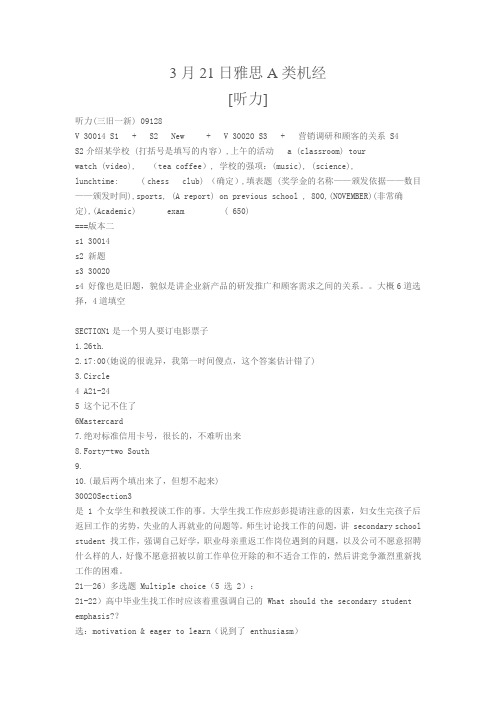
3月21日雅思A类机经[听力]听力(三旧一新) 09128V 30014 S1 + S2 New + V 30020 S3 + 营销调研和顾客的关系 S4S2介绍某学校 (打括号是填写的内容),上午的活动 a (classroom) tourwatch (video), (tea coffee), 学校的强项:(music), (science),lunchtime: ( chess club) (确定),填表题 (奖学金的名称——颁发依据——数目——颁发时间),sports, (A report) on previous school , 800,(NOVEMBER)(非常确定),(Academic) exam ( 650)===版本二s1 30014s2 新题s3 30020s4 好像也是旧题,貌似是讲企业新产品的研发推广和顾客需求之间的关系。
大概6道选择,4道填空SECTION1是一个男人要订电影票子1.26th.2.17:00(她说的很诡异,我第一时间傻点,这个答案估计错了)3.Circle4 A21-245 这个记不住了6Mastercard7.绝对标准信用卡号,很长的,不难听出来8.Forty-two South9.10.(最后两个填出来了,但想不起来)30020Section3是 1 个女学生和教授谈工作的事。
大学生找工作应彭彭提请注意的因素,妇女生完孩子后返回工作的劣势,失业的人再就业的问题等。
师生讨论找工作的问题,讲 secondary school student 找工作,强调自己好学,职业母亲重返工作岗位遇到的问题,以及公司不愿意招聘什么样的人,好像不愿意招被以前工作单位开除的和不适合工作的,然后讲竞争激烈重新找工作的困难。
21—26)多选题 Multiple choice(5 选 2):21-22)高中毕业生找工作时应该着重强调自己的 What should the secondary student emphasis??选:motivation & eager to learn(说到了 enthusiasm)我听到那个女的问那个男的学历真的很重要吗?那个男的回答说:well,actually the qualfication doesn't mean that important,those employees who have lower education than your college students got lot of working experiences however the students who have just graduate from schools were lack of skills and experience,thus they maybe emphasize the charateristics of themselves like eagerness to learn,willingness to ...and easy going to each other and so on.) 23-24)妇女生完小孩后再工作难的原因是?选:had little time to work for she need to take care the family & hard to re-adjust to work25-26)用人单位不愿雇佣什么样的人?选:sacked from the former job & eave job didn't suit them(我听见的是那个女的问,用人单位在挑选应聘者时有没有什么忌讳的内容呢,那个男的说,公司在用人的时候有些人是显然不会予以考虑的,比如 betray 原来公司的人,还有 quite the job only because they don't like it,因为前者有可能还会背叛现在的公司,后者肯能也会讨厌现在申请的这个工作,如果他们都成功被应聘了的话)27—29)多选题 Multiple choice(7 选 3):为什么不愿雇佣 retired worker?27. 选:所从事的行业已过时28. 选:hard to train29. 选:年龄偏大30)填空:The (presentations) and appearance of applicant is more important.clotheslychee_vino 回忆:1-2. motivation and eager to learn3-4. very mature, hard to re-adjust to work5-6. sacked from previous job, leave job didn't suit them7-9. age(too old), lack of experience of new industry10. clothes[口语]厦门基金楼 601 room,interesting news: what ? why?part 3 考了中国人读报习惯,电视和收音机受欢迎程度,网络会成为news的传播方式吗?part 2 描述一个有水的地方,基金楼 401 room,birthday怎么过,part 3你最近读的一本书杭州文晖路考场1303口语回忆PART1: 问了一些类似名字啊,COME FROM之类的你家住哪儿,怎么样的房子。
Final-listening test for 2009
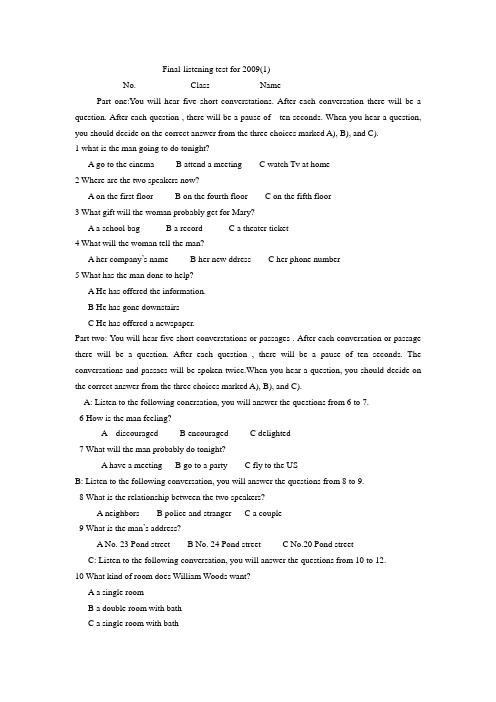
Final-listening test for 2009(1)No.____________ Class___________ Name______________Part one:You will hear five short converstations. After each conversation there will be a question. After each question , there will be a pause of ten seconds. When you hear a question, you should decide on the correct answer from the three choices marked A), B), and C).1 what is the man going to do tonight?A go to the cinemaB attend a meetingC watch Tv at home2 Where are the two speakers now?A on the first floorB on the fourth floorC on the fifth floor3 What gift will the woman probably get for Mary?A a school bagB a recordC a theater ticket4 What will the woman tell the man?A her company’s nameB her new ddressC her phone number5 What has the man done to help?A He has offered the information.B He has gone downstairsC He has offered a newspaper.Part two: You will hear five short converstations or passages . After each conversation or passage there will be a question. After each question , there will be a pause of ten seconds. The conversations and passaes will be spoken twice.When you hear a question, you should decide on the correct answer from the three choices marked A), B), and C).A: Listen to the following conersation, you will answer the questions from 6 to 7.6 How is the man feeling?A discouragedB encouragedC delighted7 What will the man probably do tonight?A have a meetingB go to a partyC fly to the USB: Listen to the following conversation, you will answer the questions from 8 to 9.8 What is the relationship between the two speakers?A neighborsB police and strangerC a couple9 What is the man’s address?A No. 23 Pond streetB No. 24 Pond streetC No.20 Pond streetC: Listen to the following conversation, you will answer the questions from 10 to 12.10 What kind of room does William Woods want?A a single roomB a double room with bathC a single room with bath11 How much will William Woods pay for the room?A $ 390B $ 400C $ 49012 On which day will William Woods leave the hotel?A on Sunday Aug 29thB On Monday Aug 23rdC On Saturday Aug 28thD: Listen to the following conversation, you will answer the questions from 13to 16.13 What’s wrong with the carpet in the living room?A It is really worn out.B It is spoiled in several placesC It has a few tears here and there14 What ‘s the condition of the refrigerator?A It is in good conditionB It cannot work any more.C Its door is broken.15 What does the man think of the house?A He thinks the place is all right for its cheap rent.B He thinks he can fix all the problems in the house.C He thinks it is hard to survive under those conditions.16 What will the woman probably do at the end of the conversation?A She helps him fix up the house.B she agrees to split the cost of rent.C She decides to look for another place.E:Listen to the following conversation, you will answer the questions from 17 to 20.17 Where does this conversation take place?A at the airportB in a restaurantC on the street18 Why does the woman like San Francisco?A It has less traffic.B It has the best food and music.C People there are friendlier.19 Where will the man leave for?A WashingtonB San franciscoC China20 What does the woman think of the man’s English?A excellentB acceptableC stranglePart one:You will hear five short converstations. After each conversation there will be a question. After each question , there will be a pause of ten seconds. When you hear a question, you shoulddecide on the correct answer from the three choices marked A), B), and C).1 Where are the speakers?A in an officeB in a classroomC in a hotel2 How muh will the woman pay if she buys two skirts?A $9B $19C $ 203 What does the woman mean?A She expects to go homeB She won’t go homeC The man should go home4 What do we know about Peter?A He has lost his ticketB He is expecting a ticket.C He went to buy a ticket5 What’s the weather like in New York these days?A windyB very hotC a bit coldPart two: You will hear five short converstations or passages . After each conversation or passage there will be a question. After each question , there will be a pause of ten seconds. The conversations and passaes will be spoken twice.When you hear a question, you should decide on the correct answer from the three choices marked A), B), and C).A: Listen to the following conersation, you will answer the questions from 6 to 7.6 Which flight will the man take?A the 8:30 flightB the 10:30 flightC the 9:30 flight7 What do you know about the flight at 8:30?A The tickets were all sold out.B It has changed its take-off timeC The plane is too crowded.B: Listen to the following conversation, you will answer the questions from 8 to 9.8 Why does the man leave early?A Because he is too tiredB Because he is catching a flightC Because he does not like to stay9 What is the man going?A He is going homeB He is going to schoolC He si going to his officeC: Listen to the following conversation, you will answer the questions from 10 to 12.10 Where did the conversation most probably take place?A in a restaurantB in the police stationC in a shop11 Which of the following is not included in the woman’s handbag?A a letterB her ID cardC a wallet12 On which day will William Woods leave the hotel?A at homeB in a bookstoreC in a coffee shopD: Listen to the following conversation, you will answer the questions from 13to 16.13 Where does the man work?A in a bankB in a restaurantC in a hotel14 What does the woman work?A in a bankB in a restaurantC in a hotel15 Does the man think his work is hard?A Yes, he does.B No, he doesn’tC It is difficult to answer16 How did the man spend last saturday?A He prepared for woeking in a bank.B He had good time in a hotel.C He was very busy with receiving guests.E:Listen to the following passage, you will answer the questions from 17 to 20.17 How many people are there in the woman’s family?Athree B four C five18 What did the children think about having dinner together at home?A They thought it was funny.B They disliked the idea at first.C They preferred eating with friends.19 How often did the family finally decide to have meals together?A every SundayB twice a weekC three times a week20 Who finally set the time for these family dinners?A the childrenB the fatherC the speaker。
2009年5月16日雅思听力机经
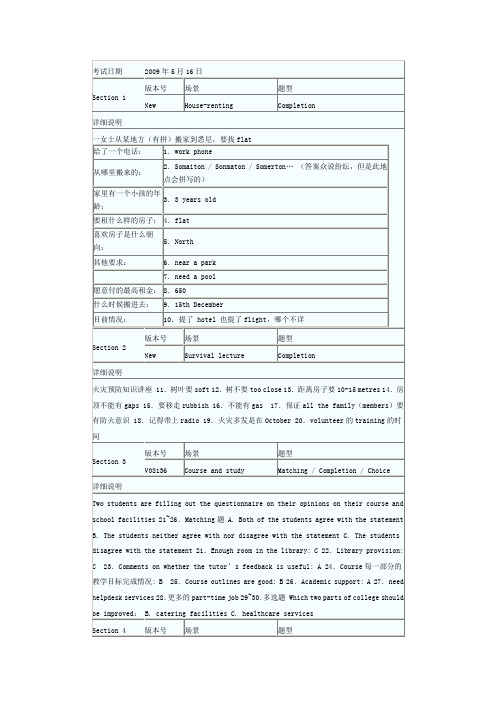
3.3 years old
要租什么样的房子:
4.flat
喜欢房子是什么朝向:
5.North
其他要求:
6.near a park
7.need a pool
愿意付的最高租金:
8.650
什么时候搬进去:
9.15th December
目前情况:
10.提了 hotel 也提了flight,哪个不详
Section 2
版本号
场景
题型
New
Survival lecture
Completion
详细说明
火灾预防知识讲座 11.树叶要soft 12.树不要too close 13.距离房子要10-15metres14.房顶不能有gaps 15.要移走rubbish 16.不能有gas 17.保证all the family(members)要有防火意识 18.记得带上radio 19.火灾多发是在October 20.volunteer的training的时间
Section 3
版本号
场景
题型
V08136
Course and study
Matching / Completion / Choice
详细说明
Two students are filling out the questionnaire on their opinions on their course and school facilities 21~26.Matching题 A. Both of the students agree with the statement B. The students neither agree with nor disagree with the statement C. The students disagree with the statement 21.Enough room in the library: C 22.Library provision: C 23.Comments on whether the tutor’s feedback is useful: A 24.Course每一部分的教学目标完成情况: B 25.Course outlines are good: B 26.Academic support: A 27.need helpdesk services 28.更多的part-time job 29~30.多选题 Which two parts of college should be improved: B. catering facilities C. healthcare services
09年11月9日雅思听力
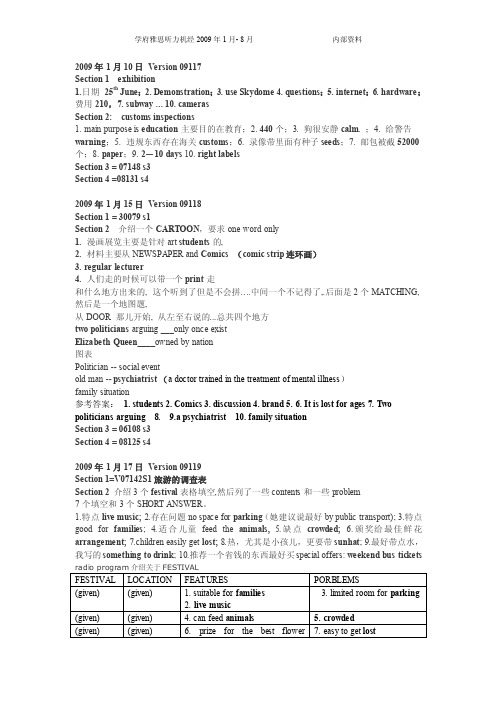
2009年1月10日Version 09117Section 1 exhibition1.日期25th June;2. Demonstration;3. use Skydome4. questions;5. internet;6. hardware;费用210,7. subway ... 10. camerasSection 2: customs inspections1. main purpose is education主要目的在教育;2. 440个;3. 狗很安静calm. ;4. 给警告warning;5. 违规东西存在海关customs;6. 录像带里面有种子seeds;7. 邮包被截52000个;8. paper;9. 2-10 days 10. right labelsSection 3 = 07148 s3Section 4 =08131 s42009年1月15日Version 09118Section 1 = 30079 s1Section 2介绍一个CARTOON,要求one word only1. 漫画展览主要是针对art students的,2. 材料主要从NEWSPAPER and Comics (comic strip连环画)3. regular lecturer4. 人们走的时候可以带一个print走和什么地方出来的, 这个听到了但是不会拼….中间一个不记得了,.后面是2个MATCHING, 然后是一个地图题,从DOOR 那儿开始, 从左至右说的...总共四个地方two politicians arguing ___only once existElizabeth Queen____owned by nation图表Politician -- social eventold man --psychiatrist (a doctor trained in the treatment of mental illness)family situation参考答案: 1. students 2. Comics 3. discussion 4. brand 5. 6. It is lost for ages 7. Two politicians arguing 8. 9.a psychiatrist 10. family situationSection 3 = 06108 s3Section 4 = 08125 s42009年1月17日Version 09119Section 1=V07142S1旅游的调查表Section 2 介绍3个festival表格填空,然后列了一些contents和一些problem7个填空和3个SHORT ANSWER。
2009年9月后机经重点
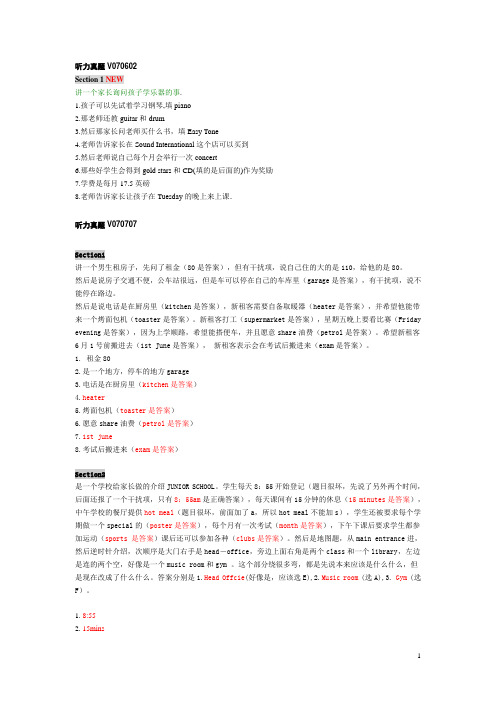
听力真题V070602Section 1 NEW讲一个家长询问孩子学乐器的事.1.孩子可以先试着学习钢琴,填piano2.那老师还教guitar和drum3.然后那家长问老师买什么书,填Easy Tone4.老师告诉家长在Sound International这个店可以买到5.然后老师说自己每个月会举行一次concert6.那些好学生会得到gold stars和CD(填的是后面的)作为奖励7.学费是每月17.5英磅8.老师告诉家长让孩子在Tuesday的晚上来上课.听力真题V070707Section1讲一个男生租房子,先问了租金(80是答案),但有干扰项,说自己住的大的是110,给他的是80。
然后是说房子交通不便,公车站很远,但是车可以停在自己的车库里(garage是答案),有干扰项,说不能停在路边。
然后是说电话是在厨房里(kitchen是答案),新租客需要自备取暖器(heater是答案),并希望他能带来一个烤面包机(toaster是答案)。
新租客打工(supermarket是答案),星期五晚上要看比赛(Friday evening是答案),因为上学顺路,希望能搭便车,并且愿意share油费(petrol是答案)。
希望新租客6月1号前搬进去(1st June是答案),新租客表示会在考试后搬进来(exam是答案)。
1. 租金802.是一个地方,停车的地方garage3.电话是在厨房里(kitchen是答案)4.heater5.烤面包机(toaster是答案)6.愿意share油费(petrol是答案)7.1st june8.考试后搬进来(exam是答案)Section2是一个学校给家长做的介绍JUNIOR SCHOOL。
学生每天8:55开始登记(题目很坏,先说了另外两个时间,后面还报了一个干扰项,只有8:55am是正确答案),每天课间有15分钟的休息(15 minutes是答案),中午学校的餐厅提供hot meal(题目很坏,前面加了a,所以hot meal不能加s),学生还被要求每个学期做一个special的(poster是答案),每个月有一次考试(month是答案),下午下课后要求学生都参加运动(sports 是答案)课后还可以参加各种(clubs是答案)。
09版本雅思听力机经
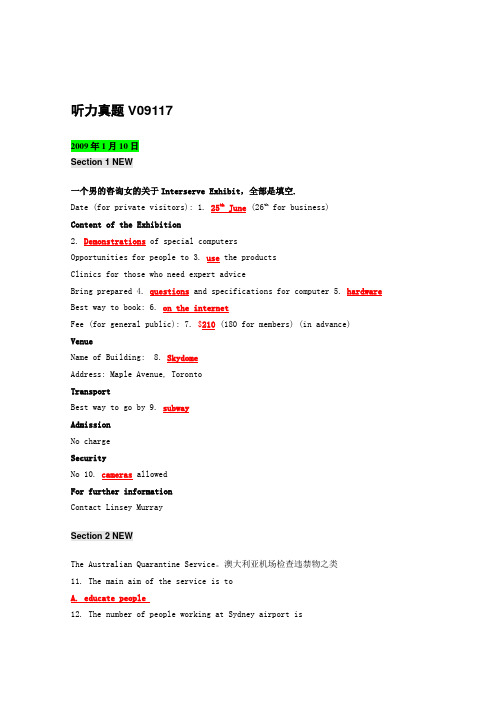
听力真题V091172009年1月10日Section 1 NEW一个男的咨询女的关于Interserve Exhibit,全部是填空.Date (for private visitors): 1. 25th June (26th for business)Content of the Exhibition2.Demonstrations of special computersOpportunities for people to 3. use the productsClinics for those who need expert adviceBring prepared 4. questions and specifications for computer 5. hardware Best way to book: 6. on the internetFee (for general public): 7. $210 (180 for members) (in advance) VenueName of Building: 8. SkydomeAddress: Maple Avenue, TorontoTransportBest way to go by 9. subwayAdmissionNo chargeSecurityNo 10. cameras allowedFor further informationContact Linsey MurraySection 2 NEWThe Australian Quarantine Service。
澳大利亚机场检查违禁物之类11. The main aim of the service is toA. educate people12. The number of people working at Sydney airport isA. 44013. Dogs are chosen becauseB. They stay calm.specifically: A.have good smell B. kept clam C. easier trained14. The number of postal items that were dealt with last year amounted toA. 52,00015. People carrying items that are not allowedC. will be given a warning.16. When goods carried are found with insects, they willB. be dealt with by the customs17. A video that was checked was found withB. plant seeds18. The acceptable material for packing goods in Australia is paper.19. The belongings most of time are refused due to problems with the labels.20. The customs must be given notice of the goods from two to ten days before it arrives in Australia.Section 3=V07148S3Section 4=V08131S4听力真题V091182009年1月15日Section 1=V30079S1Section 2 NEW是介绍一个CARTOON的1. students2. Comics3. regualr lecturer4. print5.politian only once exsit6.Queen own by nation图表7. politian8. event9. old man --phartist10. family situationSection 3=V06108S3Section 4= V08125S4听力真题V090112009年1月17日Section 1=V070714S1Section 2讲节日活动的安排。
2009年1月10日机经

2009年1月10日机经01月10日雅思A类机经[听力]听力超级简单,第三个section是几经上的,说的chemistry,egineering什么的,我机经只是看了看,就发现这一个是老题,不过其他section,尤其是前两个挺简单的。
听力是2新2旧, S4 是V08131 的S4听力:S3,4都是机经上的,一个是转专业,一个是engine的发展V09117貌似三新一旧Section 1一个男的咨询女的关于**(忘了)的事情,全部填空答案好像有1.时间:25th June有问一个有什么好处的,----- products,晕,第二个就开始没听到了,后来硬着头皮写了一个use(** public) in advance要先给多少钱的,有误导,先说如果是member 就 180,不是member就210,然后男的说他不是,所以应该是210Name of Building: SkydomeBest to go by Subway还有一个是说***最方便的方法是On the Internetsepecifiction(这个词的拼写不确定)to your computer,我写的是at home, 不确定其他忘了section 2是说澳大利亚机场的一些规定.....选择+填空1. 好像是说为什么设那些rules,应该是educating.....2.有多少people work at airport, 4403. 为什么选那些狗,我选C,不确定A.have good smellB. kept clamC. easier trained4. 好像是说有多少东西被没收了last year,我选AA. 52,000B.***C.****5. video我选的是A,不确定A. ban filmB. seedsC. children's toy填空:1.最好的包装是paper2.为什么进口的物品会有问题right labels3.忘了4.要提前多少通知海关from 2 to 10 days before arrive the airportsection 3,机经version 07148section 4,***的发展历史之类的,两个选择其余填空题目忘了,最后一个空填meet[口语]1.墨尔本的。
09年4月18日雅思听力机经汇总
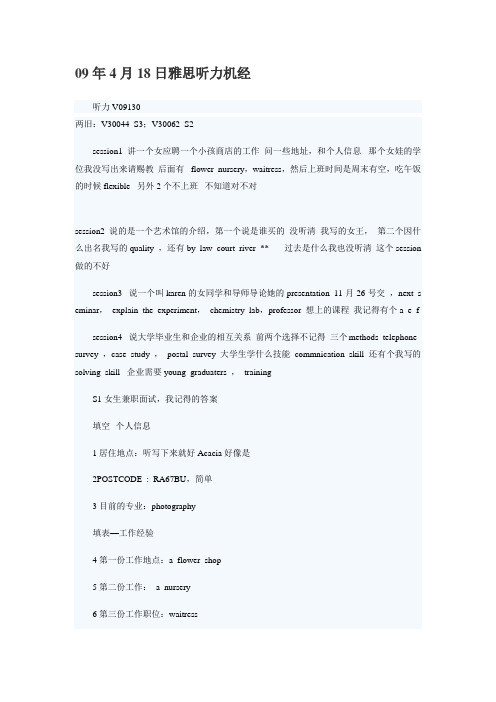
09年4月18日雅思听力机经听力V09130两旧:V30044 S3;V30062 S2session1 讲一个女应聘一个小孩商店的工作问一些地址,和个人信息那个女娃的学位我没写出来请赐教后面有flower nursery,waitress,然后上班时间是周末有空,吃午饭的时候flexible 另外2个不上班不知道对不对session2 说的是一个艺术馆的介绍,第一个说是谁买的没听清我写的女王,第二个因什么出名我写的quality ,还有by law court_river **__ 过去是什么我也没听清这个session 做的不好session3 说一个叫karen的女同学和导师导论她的presentation 11月26号交,next s eminar,explain the experiment,chemistry lab,professor 想上的课程我记得有个a e fsession4 说大学毕业生和企业的相互关系前两个选择不记得三个methods telephone survey ,case study ,postal survey 大学生学什么技能commnication skill 还有个我写的solving skill 企业需要young graduaters ,trainingS1女生兼职面试,我记得的答案填空--个人信息1居住地点:听写下来就好Acacia好像是2POSTCODE : RA67BU,简单3目前的专业:photography填表—工作经验4第一份工作地点:a flower shop5第二份工作:a nursery6第三份工作职位:waitress第四份已给选择工作时间的喜好(a没问题/b不一定/c绝对不行):7 Weekend?:a8 7pm后:c9 Holiday:a10 Lunch time:bS2 博物馆(政府支持的),展览馆历史及各种服务,不止一个空间这个最难了,很受打击,主要是答案不明确,没什么提示选择11 who buy the first painting? 我不清楚答案,55555说了博物馆是state支持的非royal,后来我就迷失了,选了b,不确定A QueenB stateC a businessman12 馆里作品的特点?迷糊,捕捉到“high standard“肯定是aA qualityB number?C??13 在CW? 馆里有啥??忘记了,选了“这里的作品最新”不确定A ?B 新?C 多?14 关于在这个馆里的guide tour啥的,确定选a,还有另外的服务也是freeA freeB 每天三次??C ??15 每周有一天关门的时间是不同的,几点关?(一周开六天,10-9或者10-6, 我迷糊了,选的6,好像反了,那个合乎常理呢?大家要注意听,保佑我吧)A after 6B after 9C after 10接着是几个填空:关于另3个馆的介绍16 A馆位置by law Cxxxx_river ,near harbor挣扎了半天拼写17 B 馆特点是材料,use recycled materials, 我写的recycle!!!!!!!!!!!!!!!!555518 在top floor 展示的都是local artists的作品19 C馆18交通工具by taxi20 原来是啥地方warehouseS3 学生和老师讨论presentation填空2个21建议学生Need Accurate references22 还需要more examples 好像是问答5个23 什么时候做presentation?Next seminar24 哪里做? Chemistry Lab25 做的时候有什么要求? Explain experiment 不确定啊,explain这个词没问题了,单复数也不确定55526 上交作业的deadline? 3rd December 有干扰26 November 但这个是给老师审查的时间27 presentation谁来打分?professor有干扰”your tutor”我不知道哪个是准的,按常理出牌了28/29/30多项选择三个, 该女生选课的讨论,老师最后没说2句,主要听她侃就好,顺序不太准A analysis data好像是B collect data是答案C p开头科目D ph开头科目,不常见,是答案EFS4 关于大学生就业的分析选择2个,忘记+困难31 关于录取形式。
2009年4月18日雅思听力机经
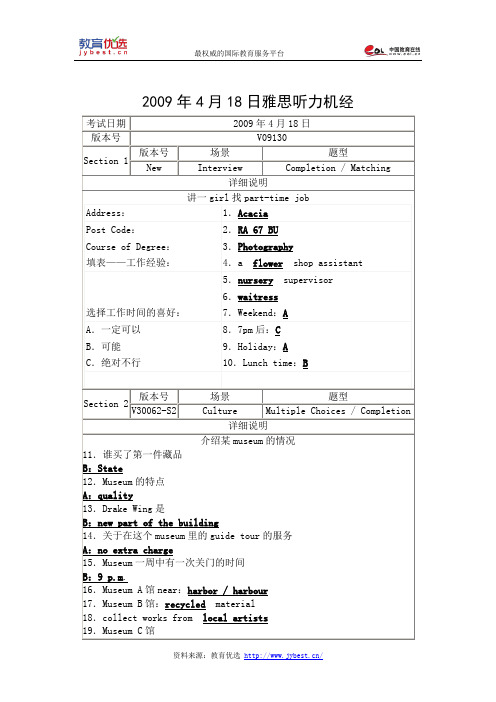
2009年4月18日雅思听力机经考试日期2009年4月18日版本号V09130Section 1 版本号场景题型New Interview Completion / Matching详细说明讲一girl找part-time jobAddress:1.AcaciaPost Code:2.RA 67 BUCourse of Degree:3.Photography填表——工作经验:4.a flower shop assistant5.nursery supervisor6.waitress选择工作时间的喜好:7.Weekend:AA.一定可以8.7pm后:CB.可能9.Holiday:AC.绝对不行10.Lunch time:BSection 2 版本号场景题型V30062-S2 Culture Multiple Choices / Completion详细说明介绍某museum的情况11.谁买了第一件藏品B:State12.Museum的特点A:quality13.Drake Wing是B:new part of the building14.关于在这个museum里的guide tour的服务A:no extra charge15.Museum一周中有一次关门的时间B:9 p.m.16.Museum A馆near:harbor / harbour17.Museum B馆:recycled material18.collect works from local artists19.Museum C馆B:by river taxi20.这个museum以前是做什么的:warehouseSection 3 版本号场景题型V30044-S3 Course and StudyCompletion / Multiple Choices详细说明A girl student discussed with her tutor about a presentation. 21.Check the accuracy of references in the last section22.Need to give more examples23.When will she give her presentation: next seminar24.What will she do during the presentation: explain the experiment carefully25.By which date will she submit an abstract: 26th November 26.Where does the presentation take place: in Computer Room 27.The presentation will be graded by professor28~30.Circle three subjects she will choose in next termB:communication skillC:intercourse analysisF:psycholinguisticsSection 4 版本号场景题型New Lecture Multiple Choice / Completion详细说明关于大学生就业的研究分析31.high development in general education的resultC:constant number in enrolled students32.某个人的论文结论don't have support based,问其结论:C:很难调查33.telephone survey34.case study35.postal survey36.lack problem-solving skill(s)37.communication skill38.学生要在两方面加强:self-evaluation,group discussion 39.Employer主张新毕业的员工参与:participation of young graduates involved in decision-making40.offer more future training综合点评二旧二新Section 2、3虽是旧题,但有一定难度。
2009年雅思口语机经汇总
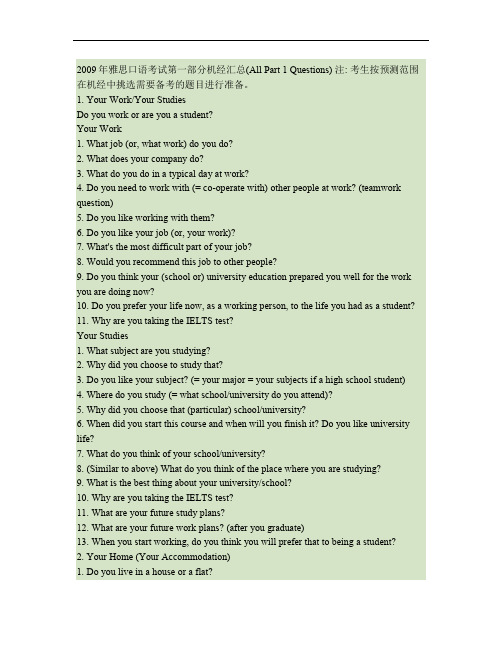
2009年雅思口语考试第一部分机经汇总(All Part 1 Questions) 注: 考生按预测范围在机经中挑选需要备考的题目进行准备。
1. Your Work/Your StudiesDo you work or are you a student?Your Work1. What job (or, what work) do you do?2. What does your company do?3. What do you do in a typical day at work?4. Do you need to work with (= co-operate with) other people at work? (teamwork question)5. Do you like working with them?6. Do you like your job (or, your work)?7. What's the most difficult part of your job?8. Would you recommend this job to other people?9. Do you think your (school or) university education prepared you well for the work you are doing now?10. Do you prefer your life now, as a working person, to the life you had as a student?11. Why are you taking the IELTS test?Your Studies1. What subject are you studying?2. Why did you choose to study that?3. Do you like your subject? (= your major = your subjects if a high school student)4. Where do you study (= what school/university do you attend)?5. Why did you choose that (particular) school/university?6. When did you start this course and when will you finish it? Do you like university life?7. What do you think of your school/university?8. (Similar to above) What do you think of the place where you are studying?9. What is the best thing about your university/school?10. Why are you taking the IELTS test?11. What are your future study plans?12. What are your future work plans? (after you graduate)13. When you start working, do you think you will prefer that to being a student?2. Your Home (Your Accommodation)1. Do you live in a house or a flat?2. Please describe the place where you live.3. How have you decorated your home (or, your room)?4. Do you have anything (hanging) on the wall of your home (or your room)? (e.g., decorations)5. What can you see when you look out the window of your room?6. What is the environment like in your neighbourhood?7. Do you like your neighbours?8. What kind of people are your neighbours?3. Your Hometown1. Where is your hometown? (Or, what part of China do you come from?)2. Do you think you'll always live there?3. Where do you live at the moment?4. Do you like your hometown? (Why?/Why not?)5. What sorts of buildings are there in your hometown?6. What would you say is the best part of your hometown?7. What's the most famous thing about your hometown?8. Is there anything worth visiting in your hometown?9. Has your hometown changed much in the past few years? (e.g. 20 years)10. Would you say your hometown is suitable for children to grow up in?11. What parts of your hometown are most suitable for families and children?12. What's the weather usually like in your hometown?13. Has the weather in your hometown changed much in recent years?4. Bicycles1. Do you ever ride a bicycle?2. What do you use a bicycle for?3. Would you say it's difficult to learn to ride a bicycle?4. How old were you when you learned to ride a bicycle?5. Why do children enjoy riding bicycles?6. Are bicycles popular in China? (or, in your hometown)7. What are the reasons why people ride bicycles?8. Would you say it's safe to ride a bicycle in the city (or, in China)?9. Has the number of bicycle riders in China changed much in the past few years?10. Do you think the number of people using bicycles (in your hometown/country) will change in the future?5. Birds1. How do you feel about birds? (Why do you feel that way?)2. How do Chinese people feel about birds?3. Are there many birds near your home?4. Have you seen many different kinds of birds? (near your home)?5. Do any birds have any particular significance in China? For example, does China have a national bird?6. Do you think birds should be protected? (Why? / Why not? How can they be protected?)7. Do Chinese people like raising (keeping) pet birds?8. Have you ever raised (kept) a pet bird?9. What did you feed it?6. Noise1. Do you mind noises? (Do any noises bother you?)2. What type of noise do you come across in your daily life?3. Are there any sounds that you like?4. Are cities becoming noisier?5. What are some of the advantages of quiet places?6. Would you like to work in a noisy place? (Why?/Why not?)7. Collecting1. Do you collect anything?2. Why do you collect ....(that/those things)?3. Is collecting a popular pastime in China?4. What items are considered collectibles in your country?5. Does anyone in your home collect anything?6. Do a lot of people in China collect things and what do they collect?7. What are the benefits of collecting? (= Why do people like collecting?)8. Computer1. Do you use computers very much?2. When do you use a computer?3. What do you use computers for?4. (Similar to above) What part do computers play in your life?5. When was the first time you used a computer?6. (Similar to above) When did you learn how to use a computer?7. Have computers changed (= influenced) your life in any way? (If yes, how?)8. Are computers used much in your country?9. Do you think computers are useful (or important) in everyday life? (How?)10. Do you think computers have changed our lives for the better? (How? Compare today& our lives in pre-computer times.)11. Do you think there there are any disadvantages (or, drawbacks) to using computers?12. Computers are now used a lot in education. What do you think of this?13. Do you think computers are perfect now or do they still need to be improved?9. Languages1. What languages do you speak?2. Besides English, have you studied any other languages?3. When did you start to study that?4. What do you think of your level in that language? (= Can you speak it well?)5. If you had the opportunity to study another foreign language, which one would you choose?6. Is it difficult to learn a foreign language? (Why?/Why not?)7. What is the most difficult part about studying a foreign language?8. What is the value of knowing a foreign language?9. What do you think is the most effective way to learn a foreign language?10. Why do people learn a second or third language?11. Do you think it's important to learn foreign languages? (Why?/Why not?)12. Why did you choose to study English?10. Dance1. Do you like to dance? (Why?/Why not?)2. What kind of dancing do Chinese people like? (Unsure if the questionmeaning is, ‘like to watch’ or ‘like to perform’ or both.)3. When do Chinese people like to dance?4. Does China have any traditional dances?5. Is traditional dance still popular today in China? (Why?/Why not?)6. Is there much difference between traditional dancing and modern dancing? (What?)7. What kinds of dancing are popular with young people in China?8. Do old people in China like the same kind of dancing as young people? (Why?/Why not?)9. What do you think is the influence of dance on society?11. Drawing (or Painting)1. Have you ever learned to draw (or paint)?2. Do you like drawing (or painting)?3. Did you like drawing (or painting) when you were a child? (Why?/Why not?)4. Do you draw (or paint) now? (Why?)5. (Similar to above) Do you ever (or, often) draw pictures in your spare time?6. How often do you draw (or paint) something?7. What kind of pictures do you like to draw?8. Do you think drawing (or painting) is difficult?9. Do you think it's important for children to learn to draw?10. What do you think are some of the benefits for children from drawing (or painting)?11. Do adults draw (or paint) very often?12. What do you think about adults drawing (or painting)?13. What are the benefits of drawing (or painting) for adults?14. What's the difference between an adult and a child learning to draw?15. Do you think a person can teach him or herself how to draw (or paint)?16. To draw (or paint) well, what factors do you think are important?12. Family Life1. Is family very important to you? (Why?)2. How much time do you spend with your family?3. If you were married, how many children would you choose to have? (Why?)13. Restaurants4. Do you usually go out to eat or do you usually eat at home?5. How often do you go to a restaurant (to eat)? (Do you often go to restaurants (to eat)? How often?)6. Why do you (or, why do people) go to restaurants?7. What kind of restaurants do you like? (prefer) (Why?) (Or, How do you choose whichrestaurant to go to?)8. What kind of restaurants do young people in China prefer? (Why?)9. What do you usually do there?10. What kind of foods do you (or Chinese people) like to eat in restaurants?11. How (do you think) restaurants have changed, over the past few years? (=How are restaurants today different to those of before?)12. How do you think they will (might) change in the future?13. What skills do people need to work in a restaurant?14. What are the qualities of a good restaurant?14. Flowers1. Do you like flowers? (Why?)2. Which/What is your favorite flower?3. What are the occasions when people send or receive flowers?4. When was the last time you gave (sent) flowers to someone?5. What meaning do flowers (= does giving flowers) have for Chinese people?6. What flowers have special meaning in China?7. Do people in China like growing flowers?8. Does anyone in your family like growing flowers?15. Rain1. Does it rain much in China? (Where? When?)2. Do you like rainy days? (= How do you feel on rainy days? = Do you feel sad on rainydays?) How does rain affect different people’s moods? (Or: How does rain effect people's lives?)3. What do you do on rainy days (or, on a rainy day)?4. Do you think rain is good? (Why?)5. Is there any part of China where it doesn't rain much? (Where?) (or: Is there an even distribution of rain throughout China?)6. What effects can a shortage of rain (a drought) have on people's lives?7. When (in what month/season) does it rain most in your hometown?8. What about the other parts of China? (In which season does it rain most in otherparts of China?)9. Can you remember any time when it rained particularly heavily in your hometown? (When?)10. Does rain ever affect transportation in your hometown? (How?)11. Do you think the seasons have changed in recent years, compared to the past? (Why? How?)16. Friends1. Is friendship (= are friends) important to you? (Why?/Why not?)2. Do you prefer to spend time with friends or spend time alone? (Why?)3. Are friends more important than family? (Why?)4. What kind of people do you like to have as friends?5. What do you and your friends do together?6. Do you like meeting new people?7. Do you like face-to-face conversations with people?8. Have you met any interesting people recently?9. What kinds of people do you like to make friends with?10. What kind of people do you like to meet (or, to talk to)?11. How do Chinese people make friends? (= where, in what situations, e.g. at school & at work.)12. Do adults and children make friends in the same way?13. How do people get to know (get to meet) new people?14. Do you think it's easy to form new friendships?15. How long does it take to get to know a person?16. Do you think it's possible to become real friends with the people you meet on the internet, for example, on chat sites or personal introduction sites? *17. How will you make new friends in the future?18. Can you remember your first (or, your earliest) friends? (Who were they?)17. Parks and Public Gardens1. Are there many parks or public gardens where you live (or, in your hometown)?2. Do you often (or, ever) go to a park or a (public) garden?3. How often do you go there?4. What do you (like to) do when you go to a park or public garden?5. What do other people do in these places?6. When do other people go there?7. Do you think parks and public gardens are important to a city? (Why?/Why not?)8. (Similar to above) Do you think every city and town should have parks and public gardens? (Why?/Why not?)9. (Similar to above) What do you think are the functions of parks and public gardens?18. Housework1. Do you usually do any housework?2. Who usually does the housework in your home?3. Do you like to do housework? (Why?/Why not?)4. What housework do you least like doing? (Why?)5. Who usually does the housework in your home?6. When you were a child, did you ever do any housework?7. Do you think it's important for children to do some housework?8. If a child helps do some of the family housework, how do you think this affects the child's development?9. What do you do to help the family?10. Have there been any changes in the housework people do since the time when your parents were your age?11. Do you think people should be paid to do household chores?19. People's Ages1. Do you enjoy being the age you are now?2. If you could change your age, what age would you choose to be?3. What age do you think will be the best (happiest?) in your future?4. What do you think is the most important age in a person's life? (Why?)5. Are birthdays important in Chinese culture?6. What birthday is most important in Chinese culture?7. In China, which birthday is more important, one's 18th birthday or one's 20th birthday?8. Do you think people have different pressures at different times of their life?9. What age do you think is the happiest in people's lives?10. What age in life is the most difficult? (Why?)20. Daily Routine1. What are you usually doing at this time?2. Do you do the same thing(s) every day?3. Tell me something about your daily routine.4. (If you do not work) For you, what's the best time of day for studying?5. (If you work) For you, what's the best time of day (or, day of the week) for working?6. What part of the (= your) day do you like best? (Why?) (= What part of your daily routine makes you the happiest? Or = What part of the day are you most efficient?)7. (Similar to above) What's your favourite time of the day? (Why? What do you doat that time?)8. If you could make one change to your daily routine, what would it be?9. (Similar to above) Would you like to change anything about your daily routine right now (or, about your life)? (If yes, what?/Why?)10. If you had more free time, what would you do?11. Do you get together with your fellow students/workcolleagues (=classmates/workmates) after classes/work? (What do you do?)12. Do you like to plan what you will do each day? (Why?/Why not?)13. How do you plan your day?14. What do you usually do at this time of day? (= What are you usually doing at thistime of day?)15. Do you usually do the same things at the same time each day?16. How do you plan (organize) your study time?17. Do you ever (or, do you often) change these plans?18. Can you think of any improvements to your daily routine?21. Television and Radio1. Do you like watching TV?2. What types of TV programs do you (most) like to watch?3. What programs do you (most like to) watch?4. What's your favourite TV program? *5. Do you prefer to watch TV or listen to the radio? (Why?)6. What types of program do children in China like to watch?7. What (type of) programs did you like to watch when you were a child? (Why?)8. What was your favourite TV program when you were a child? *9. Do people in China watch any foreign TV programs?10. In China, is it possible for you to watch any TV programs in English? (What programs?)11. How do they get these programs?12. Do you think English language programs are necessary? (Why?/Why not?)13. What do you think are the benefits of watching TV programs in English?22. Photography1. Do you like to take photographs? (Why?)2. Do you prefer to take photos yourself or to have other peopletake photos? (Why?)3. How long have you liked taking photographs? (Include 'since' or 'for' in your answer.E.g., '... since I was about ten years old' or '... for about 5 years'.)4. How (why) did you become interested in photography?5. How often do you take photographs? (You should include an approximate time, such as 'about once every 2 or 3 months.')6. In what situations do you take photographs?7. What kind of photos do you like to take? (Why?)8. Do you prefer to take pictures of people or of scenery?9. Who do you take photos of?10. How do you keep your photos?11. Do you keep your photographs on your computer?12. Are there any photos on the walls of your home?13. Do you frame (or have you framed) any of your photos? (If yes, which? & why?)14. Do you prefer to send postcards to people or to send photos that you took yourself? (Why?)23. Teachers1. What do you think of teachers?2. Did you (do you) like your high school teachers? (Why?/Why not?)3. Did you like your primary school and high school teachers?4. Do you think it's important to like your teachers?5. When you were in school (primary school or high school) did any of your teachers have a (strong) influence on you?6. Which teacher (or, teachers) influenced you?7. Do school students in China like their teachers?8. Are teachers in China very strict? (Why?/Why not?)9. Were (are) your high school teachers very strict?10. Do you think there are any benefits from teachers being strict with the students?11. What qualities should a good teacher have?12. Have you ever thought of being a teacher?13. What kind of teacher do students most like?14. What sort of personality do teachers need to have?15. Are you an extroverted or an introverted type of person?24. Seasons1. Describe the four seasons in your hometown.2. Which season is your favourite? (Why?)25. Newspapers1. Do you often read newspapers?2. How old were you when you first started to read newspapers?3. Do you think it's important to read newspapers? (Why?/Why not?)4. Why do (you think) people read newspapers?5. What different types of newspaper are there in China?6. Do you care about the news?7. Is the news important (to you)?8. What kinds of news do Chinese people read in newspapers?9. Do you prefer to read about domestic (or local) news or international news? (Why?)10. What are some methods that newspapers use to attract readers?11. What influence do you think newspapers have on society?12. Do you think the internet is a good way to get news?26. Sports Teams1. Do you like sport? (Why?/Why not?)2. Why do some people enjoy (watching) sports events?3. What are the most popular sports in China? (Or: What's the mostpopular sport in China?)4. Does China have any good sports teams? ( = What are some of the best sports teams in China?) (China has many world class teams - you don't have to restrict your answer to world champion teams. Avoid table tennis because some people think a pair of table tennis players is not called a 'team' but instead, a 'pair'.)5. Which is your favourite Chinese sports team?6. Have you watched this team compete?7. Has this sports team been successful recently?8. Is there any team you don't like? (If yes, include why you dislike it.)9. Do you think teamwork is important? (Why?)27. Family Life1.2.3.4.5.6. Who are the people in your family? What does your family do together? What do the people in your family do each day? ( = What does each person do?) * In what situations do you think family is more important than friends? In what situations do you think friends are more important than family? What is the biggest influence in your life? 28. Games1. Do you often play games?2. Can you play this game with friends?3. How do people learn to play this game?4. Can you get information about this game on the internet?5. Are there other ways to get information about this game?6. What benefits do you get from playing this game?7. Do different age groups of people like to play different games?8. What games are popular in China?9. What's the most popular game in China?10. How have computers influenced the games people play?11. Do you know of any games that are studied in university? (Hint: Games Theory) *12. What can people learn from games?29. Meals1. Which meal do you prefer, lunch or dinner (supper)? (Why?)2. What do you usually eat for lunch?3. What do you usually eat for your evening meal?4. Do you prefer to eat three full meals a day or do you prefer to eat many snacks throughout the day?5. Which meal of the day do you think is the most important? (Why?)6. Do you think breakfast is important? (Why?/Why not?)7. What do you usually eat for breakfast?8. Is there any special food that you particularly like?9. Would you like to try any new food? (If yes, give an example &/or say why.)10. Do you like cooking (or, preparing your own meals)? (Why?/Why not?)30. Letters & Emails1. Do you often write letters/emails?2. How often do you write letters or emails?)3. Who do you usually write to and what do you write about?4. How do you feel when you receive letters or emails?5. What kinds of emails (or letters) do you most like receiving? (Why?) (= What kinds of emails/letters make you happy?)6. Do you often write (or, send) emails?7. Do you think emails are useful?8. What kinds of emails do you send and receive? (Business emails? Personal emails?)9. Do you think it is a good thing that some companies send out letters/spam emails for the purpose of advertising?10. How often do you write letters?11. Do you like writing letters to your relatives and friends? (Why?/Why not?)12. Do you and your friends keep in touch by (handwritten) letter?13. How do you keep in touch with (= keep in contact with) your friends and relatives? (...by email, letter, by phone or some other way?)31. Food/Cooking1. Is food important to you? (Why?)2. What kind(s) of food do you particularly like?3. What's your favourite food?4. Do you usually make that yourself or do you usually buy it?5. How often do you eat that?6. Have you always liked that food?7. When did you start to like that food?8. Is there any food you don’t like? (Why?)9. What food did you like (most) when you were a child?10. Is there any food that you liked when you were a child but you don't like now?11. What types of food do children generally like to eat?12. What kinds of food are most popular in China? or, What kinds of food do Chinese people eat?13. Do you know how to make (prepare) a meal?14. (If answering, 'No' to the previous question) Have you ever thought about learning how to cook?15. Who usually does the cooking in your home?16. Do you like cooking? (Why?/Why not?)17. What do you like to cook?18. When you were young, did you learn how to make a meal?32. Reading1. Do you like reading? (Why?/Why not?)2. How much reading do you do everyday?3. When did you learn to read?4. What kinds of books (or, what kinds of things) do you usually read?5. What types of things (books) do you dislike reading?6. How many hours a day would you say you spend on reading?7. Where do you usually read?8. Do you do much reading at work?9. Since you started working, have you continued to read as much as you did when you were a student?10. In general, do adults today (in China) like reading?11. What reading materials do different kinds of people like?12. What kinds of books do average adults in China read?13.14.15.16.17.18.19. Do you think adults should read more? Did you like reading when you were a child? (What did you read then?) What reading materials do young people (e.g. aged 15 to 25) like to read? Do Chinese children (aged 4 to 12) (or, young people) today like reading? What sorts of things (or, books) do children (in China) like to read? Do you think children today should spend more time reading? What would you say is a suitable amount of time for children to spend reading eachday?33. Films1. How often do you go to the cinema?2. Are most of the people in the cinema usually children or adults?3. How much time does it take to watch one film?4. How much time do you spend watching films?5. Who do you usually watch films with?6. Do you prefer to watch films in a cinema or at home? (Why?)7. What kind of films do you like to watch? (Why?)8. Is there any kind of film that you don't like to watch? (Why?)34. Shopping1. Do you like (going) shopping? (Why?/Why not?)2. What do you think is the most difficult (or, unpleasant) part about shopping?3. Is there anything you don't like about shopping?4. What don't you like about shopping?5. Do you often go shopping?6. Who do you (usually) go shopping with?7. What do you usually buy when you go shopping?8. What are the most fashionable things to buy?9. Do you have a regular time to go shopping?10. Do you like to go window-shopping? (Why?/Why not?)11. Who usually does the shopping in your home?35. Sport/Exercise1. Do you like any particular sports? (What sports?)2. Do you like to do daily exercise? (Why?/Why not?)3. What sports or exercise do you like to do? (Why?)4. How do you do it?5. Do you use any equipment for this exercise (or sport)?6. Do you participate in any sports with your friends?7. Are there any sports facilities (or, exercise facilities) near where you live? (for the public to use)8. Did you take part in any (organized) sport in school?9. Do you think it's important to have P.E. classes (or sports classes) at school? (Why?/Why not?)36. Clothes1. Do you think it's important what clothes a person wears? (Why?/Why not?)2. Is it important what clothes you wear at your job? (your company)3. Do you think the clothes a person wears leaves an impression on others?4. What kinds/styles of clothes do you like (or, prefer) to wear? (Why?)5. Do your friends have the same tastes in clothes as you?6. Do you think you will still be wearing the same kinds of clothes when you are old? (You could include what you think you will be or won't be wearing when you are old.)7. Do you prefer informal (= casual clothes = leisure clothes) or formal clothes? (Why?)8. Do you feel comfortable when wearing formal clothes? (Why?/Why not?)9. Do you think formal clothes are important?10. When do people wear formal clothes?37. Gifts1. Do you often give gifts to people?2. What was the last gift you received?3. What was the last gift you gave someone?4. Do you like giving presents to other people? (Why?/Why not?)5. Do you think it's easy to choose what to give other people?6. When considering a present to give to someone, how do you (or, how do people) select this gift?7. Do you think it's important to give expensive gifts?8. Have you ever given someone a gift you made yourself?9. What sorts of things do people in China usually give as gifts?10. When do people in China give gifts? (On what occasions?/In what situations?)11. Why do they give these gifts?。
雅思机经1
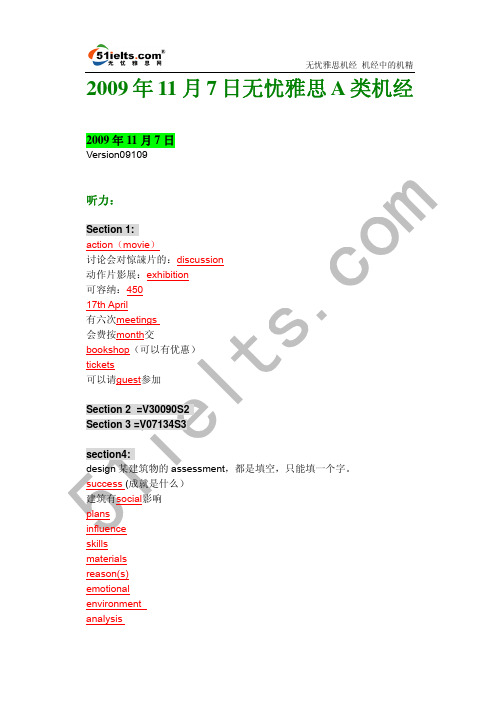
无忧雅思机经 机经中的机精2009 年 11 月 7 日无忧雅思 A 类机经2009 年 11 月 7 日Version09109听力:Section 1: action(movie) 讨论会对惊誎片的:discussion 动作片影展:exhibition 可容纳:450 17th April 有六次meetings 会费按month交 bookshop(可以有优惠) tickets 可以请guest参加 Section 2 =V30090S2 Section 3 =V07134S3 section4: design 某建筑物的 assessment,都是填空,只能填一个字。
success (成就是什么) 建筑有social影响 plans influence skills materials reason(s) emotional environment analysis无忧雅思机经 机经中的机精2009 年 11 月 7 日无忧雅思A类机经2009 年 11 月 7 日Version09109阅读:P1:桥梁诊断 题型:Matching, 选择题, picture 内容:用声纳检测桥的损失程度,有 los angels 大学的研究什么的 是 4 道选择题 貌似 a b c d 都有 然后是 4 个看图填空的 大概是哪个新发明 测量装置是怎么安装 怎么测量的 集中在一段里都能找到好像 还是 5 个段 落的匹配 有个是 10 年发展的 一个是未来很好的发展的 还有就是 2 个 how 开头的问装置怎么工作什么的 P2: 关于感官的 题型: T/F/NG S Matching 内容:人类的各种感官:听觉,嗅觉,视觉。
和动物的比较,还有原因。
P3:运动和兴奋 题型: Matching Y/N/NG 内容:是 mirror nervous 这个概念的提出以及它在观看体育比赛中的作用。
人一运动就兴奋是为什么和大脑有什么关系, 看比赛会引起大脑的活动什 么之类的作文: Task 1: the numbers of job in one area in the UK in 2001 to 2005 Task 2: reasons for increase of teenagers criminal acts and give your measures to reduce it.无忧雅思机经 机经中的机精口语: Describe a recent happy event in your life: 富裕和贫穷与 happy 的关系啦, 有没有目标和 happy 的关系, 现在的 happy 和以前的 happy 有什么关系。
2009年3月14日雅思口试机经
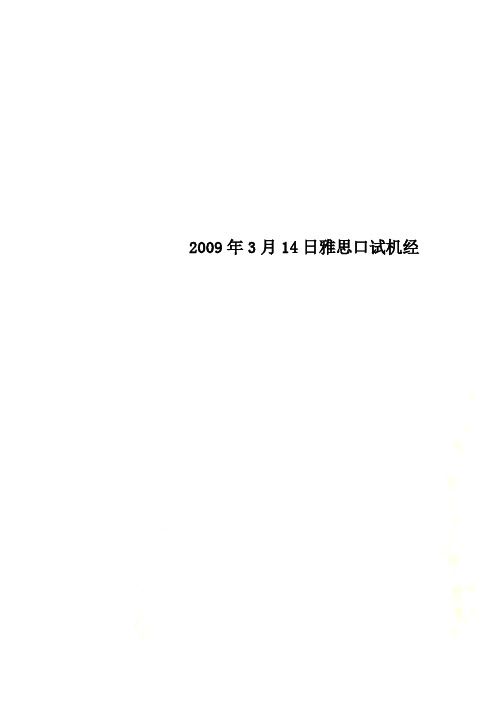
2009年3月14日雅思口试机经anyway...广州。
1:40part1 major, why choose? 喜欢travel? why 讲一个你去过觉得最吸引的地方。
再讲个你最想去的国家。
几点睡?最喜欢每天哪个时候?part2 an activity you played with other children... what is it, how to play, who you play with?part3 小朋友应5应该同其他人as a group??学到什么?我bilibala 说了一通之后。
她又问这些不能从family members学到吗??teenager 喜不喜欢as a group?当人get older 会不会不喜欢和人相处?苏州考场,第一部分自行车的问题第二部分在特殊场合穿的衣服,第三部分,正式和非正式衣服穿的场合,过去的人喜欢穿休闲服吗,什么场合穿什么衣服,制服的用处等等,我只记得那么多了。
还听说隔壁考的是sports。
北京,3月14日下午2点20,北京教育考试院 14考场changesucessadviceeducation tripnewsspots even大概就是这些好像第四个是新题。
其他的还是旧的。
祝大家和自己好运。
historical placespeechfamily membertraffic jamTV programLIBRARYfriendshiptoymusicfinancial crisisseasonadvicesuccessful experiencesportshope to buy itemcookeducational triphealthgood news杭州下午考题(第2部分)苏州365考室,一个帅小伙,他感冒了,part 1 letter,what kind of persons do you usually get letters from? what kind of letter or mail do you think is most diffcult to response.part 2 friend, what he/she like, how do you knew each others, what do you usually do part 3 relatives and friends ,which is more important苏州part2:1.温度变化2.喜欢的天气购物——想买的特别的东西,关于购买奢侈品,男女买东西的区别,购物习惯新闻会做饭的人老人festival成功的事情/阶段——怎样成功,追求成功的方式语言——怎样学,和谁学,相互怎样帮助交流信件和邮件——邮件的难处,收到人以及给哪些人信件Sports event——涉及竞争衣服季节——朋友喜欢的季节,在哪个季节做什么事情,中国的季节变化,每个季节的描述,季节和性格的关系PartyHometown关于结婚——第三部分,法定年龄,这个年龄以后会不会变化Art or sculpture——艺术长廊,年轻人和老人是否都喜欢,中国哪些可以算艺术品,哪些地方有,公共场所雕塑是否付费Swimming——第一部分,你居住附近有哪些地方可以,重庆小孩是否会游泳(第一部分还涉及自行车)Best Friend——朋友对你的重要性,可否与老板交朋友house/department——不是自己家最近的一次建议——哪个给的,是什么建议,有什么帮助,得到后的感受——建议有什么危害,老人给建议的问题3.13下午川外蹲点汇集~祝大家好运!苏州下午蹲点汇报:1.艺术品 2.成功的经历 3.名人 4.cooking 5. 第二语言学习 6.人生的年龄阶段7.书本教育和网上教育8.dressing 9.房屋建筑 10.interesting story 11.hou do your jorb well 12.四季,温度 13. hometown 14.gift 15.sport不知道是不是全了,不过应该差不多这些吧……学术旅行最喜欢干的一件事cookfriend场合衣服听到的故事雕塑,艺术品人的最重要阶段电视节目多大的时候听到的故事季节运动天津蹲点归来,去晚了,大部分COPY 大家的,明天11点考,积攒RP,一定要过啦,这次祝福我吧今天在悉尼考的好象是上周国内考的题目Part oneHouse or flat?CookingPart twoSpeechPart three围绕Speech展开:你平时听演讲多么?喜欢什么样的Speech?为什么大家在演讲时会紧张?你认为会天生演讲就很好么?那些因素对于演讲很重要?。
- 1、下载文档前请自行甄别文档内容的完整性,平台不提供额外的编辑、内容补充、找答案等附加服务。
- 2、"仅部分预览"的文档,不可在线预览部分如存在完整性等问题,可反馈申请退款(可完整预览的文档不适用该条件!)。
- 3、如文档侵犯您的权益,请联系客服反馈,我们会尽快为您处理(人工客服工作时间:9:00-18:30)。
7
2005
98% 2000
:
Language & Culture Modules Module1 Grammar---------------------------------------Fengmei Zhan Module 2 Usage------------------------------------------------Kun Xiao Module 3 Writing-----------------------------------------Fengmei Zhan Module 4 Reading--------------------------------------------- Kun Xiao Module 5 Oral English-------------------------------------Paul Harding Module 6 British Culture----------------------------------Paul Harding
The University of Warwick is “The cutting edge of what has to happen in the future”
-----Tony Blair, the Prime Minister of UK
--------
1961
1965
1986 1989 1992 1996 2001
G1.
1
G2.
45
G3.
1
Welt
-------------------------------------------------------------------------------------------------------------------
WELT
AAA AAB/ABB/BBB
Honored teacher of Pre-master Course of University of Warwick,His class is lively and interesting, enjoyed by most students.
WELT -----------------------------------------------------------------------------------------------------------------
Expert of China Communication Market IT
GM of Philips IT Service,
Senior advisor of many multinational companies Foreign expert of National Foreign Experts Board
02
3G
3G
-> -> ->
3G
××
-> -> ->
6 7 3G
6 8
(
)
GRE
Cue Card
5
02 03 04
3G
05
06
80 Version
3000 05
127
3G
:
;
127
ID: Adrian QQ:63991371 (
()
Entry Requirements
Number of Students to be Enrolled 35
Time for Application
Standard of Expenses
1.
RMaching Place):
52
9- 6
Stephen Raynor Bachelor, Oxford University
Certificated Diploma in Accounting & Finance
Principal Teaching Fellow, School of Engineering University of Warwick, UK
Native English with great understanding of British education and a good command of knowledge of Accounting and finance
Considerable experience teaching course of marketing in Siemens, Panasonic, Samsung Group, Bank of China, etc
Considerable teaching experience & multinational companies management experience
Elective Modules Board Simulation: Finance For Non-finance-------------------Fangfan Wu (Elective Module in Business School, Harvard University) Business Simulation: Total Customer Satisfaction---------------Tao Wang (Core Module in Business School, Harvard University)
Director of Overseas Market Department of Rover Group for over 10years
Beginning to teach at University of Warwick in 1980s
Marketing Supervisor of Asia Pacific, AT&T Network Communication System
WELT Warwick English Language Test
WELT
------------------------------------------------------------------------------------------------------------------
-------------------------------
3G
2009Beta1
3G
2008Beta2
Section
V30032S1 v27S2 V41S3 V30076S4 V30072S1 V50126S2 v30037s1 v30064s2 v30042s3 v71s4 V30014S1 V50133S2
Core Modules Module 1 Strategic Marketing--------------------------------Wen Sun Module 2 Business Principles & Concepts-----------------Guixiang Su Module 3 Project Management--------------------------Weiyuan Yang Module 4 Financial Analysis & Control Systems----------Wesley Zhu Module 5 Project Planning & Control-----------John Michael Newton Module 6 Joint Venture-------------------------------Stephen Raynor
BBC BCC/CCC
DCC
IELTS
8 7 6.5 6 5.5
TOEFL (Paper-based)
TOEFL (Computer-based)
620+ 600-620
550 500
260 250-260
213 173
TOEFL (iBT) 119 105 92 80 61
CPE
A A/B C
-----------------------------------------------------------------------------------------------------------------------------------------------------------------------------------
3000
JiJing
) 1
( V300** V500**
3G
Version
1 3 Section )
2009 1
3000
V21-V71
V300×× V400××
Version 0.5
Section 3G
-_-! 3
3G
3G
-----------------------------2009Beta1
3G ------------------------
3G
××
3G -----------------------------------------------
3G
3Gers
Robin Sloan Matt Thompson EPIC 2014 EPIC 2015
(
,2006) 3G
V30043S3 V06133 V30042S1 V24S2 V34S2 V37S4 V30079S4 V07135S1 V30072S3 V06125S2 V50147S V33S4
